|
|

The Turning Point
This Sunday and Beyond - December 26, 2021
Get it in PDF form with calendar
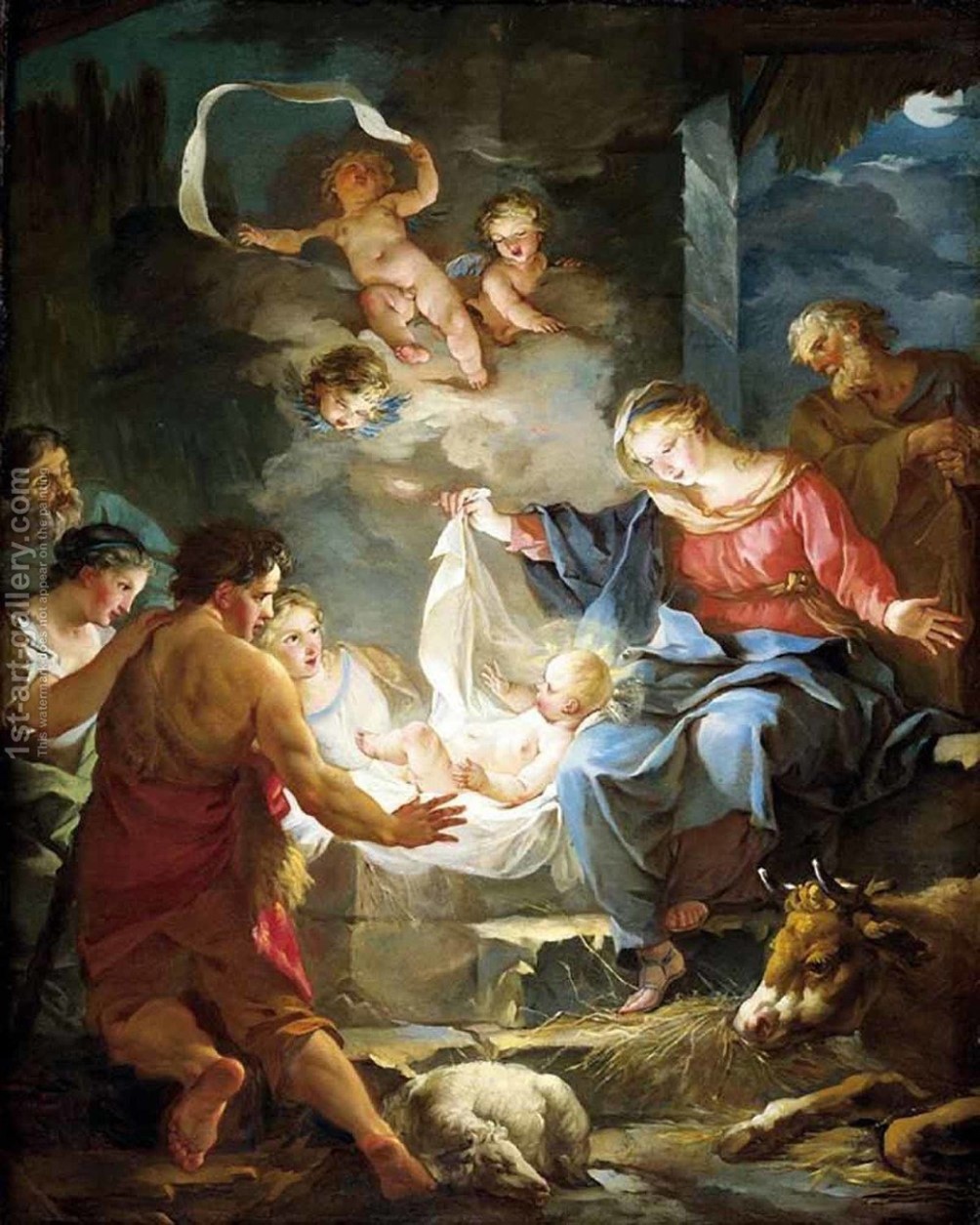
Christmas is almost here now, and this year I have heard on the radio statements like these: “This has to be a doubly special Christmas.”
I suppose what they mean is that after all we have been through this year, with the Covid-19 pandemic killing so many, and disrupting everyone’s lives, together with other social injustice issues that we have had to face, we all need to be “merry and bright” for a while.
There is nothing wrong with being “merry and bright”, with the social gatherings, the presents, the beautiful decorations, the family meals, etc. The problem is that when we focus only on these we may lose sight of the main thing.
What Christmas celebrates is actually the greatest turning point ever. There is a perfectly good reason to feel not only “merry and bright” but overjoyed and exultant in the highest degree.
The writer of the Letter to the Hebrews in Chapter 1 makes this point perfectly clear when he states:
“Long ago God spoke to our ancestors in many and various ways by the prophets, but in these last days he has spoken to us by a Son, Whom He appointed heir of all things, through Whom He also created the worlds.”
What the writer is saying is that God’s Word, the Son of the Father of all, by Whom all that is came into being, has come to live with us in flesh and bones.
Some of the prophets, like Isaiah, had already mentioned that a son of God would come to us as a child, and even if the prophet was not referring to the Messiah, but to an earthly king who would reign with justice and peace, the fact is that New Testament writers saw in these references a prefiguration of the Christ.
What the writer of Hebrews refers to here is what theologians call the great mystery of God’s Incarnation. And this is what the Christmas celebrations are really about.
What we celebrate is a wonderful mystery indeed. It is God Himself coming to live with us humans. God made flesh in the womb of the Virgin Mary by the power of the Holy Spirit and being born, according to St. Luke the Evangelist, in the town of Bethlehem (The House of Bread), which was the same town where David had been born and raised.
Never before had God become so approachable, so tangible, so close to us. His revelation was now made perfect for us. The Light that had before shone in His glorious deeds of liberation, and in His words communicated to the people through the prophets, was now shining in the face of a human baby who would become the man known as Jesus Christ.
And this Jesus Christ would show forth God’s Light in His words and deeds, and in His unconditional love towards humankind and the whole of Creation, which would demand His self-sacrifice on the cross.
After this happened, those who have heard or read the Good News of salvation, handed down from generation to generation by the New Testament writers, can no longer claim that they do not know who their God is. God has made Himself known to us in human form, and He has shown us the Way of Love as the true way to life everlasting.
We can choose to follow this Way of Life or reject it, but we can no longer claim ignorance. His Light has been clearly revealed to us.
So Christmas is the time of the greatest joy and exultation, a joy that surpasses our understanding and is certainly a million times more than being “merry and bright”. It is the time when we celebrate the greatest turning point in human lives.
Fr. Carlos Expósito, Rector
|
RETURN TO TOP
I Have Come to Do Thy Will, O God
This Sunday and Beyond - December 19, 2021
Get it in PDF form with calendar
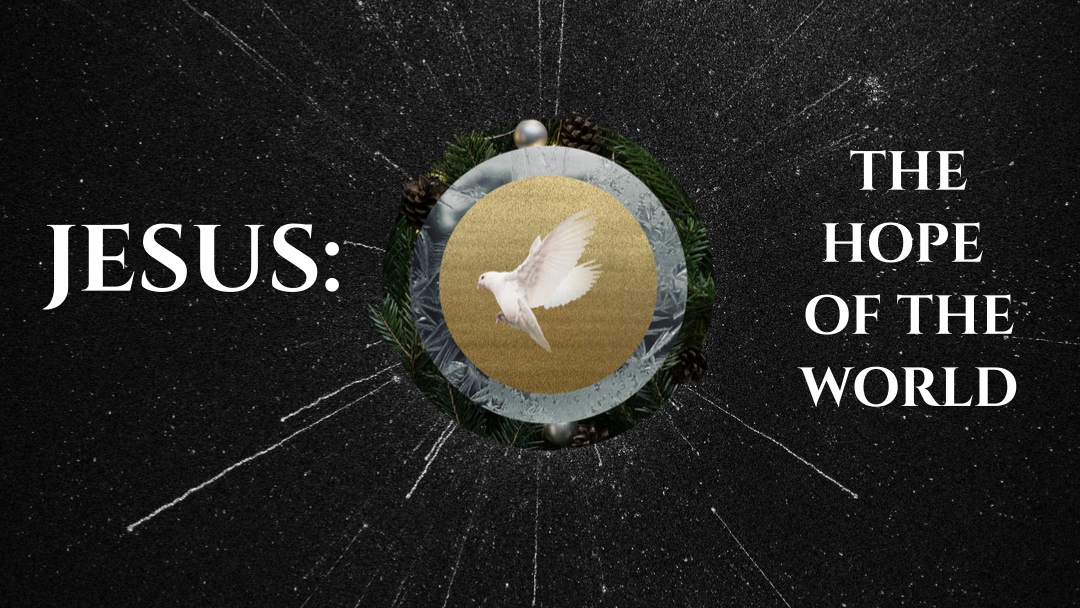
As the Advent Season comes to an end, the reading from the Letter to the Hebrews on this fourth and last Sunday before the celebration of God’s Incarnation brings us the theme of sacrifice (Hebrews 10: 5-10).
As theologians have emphasized, the wonderful mystery of God’s Incarnation that we celebrate at Christmas implies that God leaves His majestic and glorious realm and comes down to earth, made human flesh and born of the Virgin Mary, fully human, and yet, fully divine.
This is known in theological terms as God’s kenosis or self-emptying. So in its historical perspective Advent points to the mystery of God’s willing sacrifice to come to us as a human being.
But as we all know, the person of Jesus Christ, the incarnate God, is not simply the Second Person of the Holy Trinity who decided to become human so that we might come into closer contact with God’s love for us. Jesus Christ is, above all, the incarnation of perfect obedience to God’s will.
This is the main theme of the writer of Hebrews in the fragment of the letter that we read this Sunday.
The writer quotes the Greek version of Psalm 40: 6-9 and puts these words into Jesus’ mouth. The original Hebrew version reads: “Sacrifice and offering Thou didst not desire; mine ears hast Thou opened. Burnt-offering and sin-offering hast Thou not required. Then said I: Lo I come; in the volume of the book it is written of me. I delight to do Thy will, O God.”
The Greek version or Septuagint, which is probably the one the writer of Hebrews was familiar with (he may have not known Hebrew), reads “A body you have prepared for me” instead of “mine ears hast Thou opened”, but the idea is essentially the same: perfect obedience to God’s will.
The idea of Christ’s body being offered in obedience to God as the perfect sacrifice is, of course, better understood in the Greek version. Anyway, it was Jesus Christ’s willingness to obey God’s will, even if it meant giving His own body in sacrifice, that constitutes the perfect atonement for the world’s sins.
All other sacrifices that were offered to God, like the burnt offerings and all offerings for sins by the traditional Jewish religion meant nothing to the Creator of all that is. This is something that the prophets, like Samuel, Hosea, Micah, and Isaiah, and the writers of the Psalms had pointed out consistently. They all made it clear that what really pleased God was to obey Him, i.e., to do His will, which Micah properly translates as “to do justly, and to love mercy, and to walk humbly with thy God.”
Throughout His life and ministry while on earth, Jesus Christ did just that. He obeyed God’s will. He walked on the path of unconditional love and proclaimed justice and reconciliation for all. He showed His followers the radical Way of Love as the only way to true abundant life. And He was in unreconcilable opposition to the powers of evil, represented on earth by the oppressive worldly powers of His time. They unjustly condemned Him to death on the cross and may have thought they had defeated Him. But they were totally mistaken.
By raising Him from the tomb, God made Him beat the powers of evil and death. His ultimate obedience to God’s will was His ultimate victory, and it has brought us the justification from sins that no other sacrifice could bring us.
As we prepare to welcome Christ into our lives, let our hearts rejoice in thankfulness for His perfect sacrifice in obedience, and let us endeavor to imitate this obedience in our own lives.
“Thy Kingdom come; Thy will be done…”
May these be much more than mere phrases to be repeated as we recite the words Christ taught us in communal or personal prayer. May they be the main goal of our lives, so that, no matter how imperfectly, as God’s children, we also aim to incarnate Him on earth.
Fr. Carlos Expósito, Rector
|
RETURN TO TOP
The Joy of Repentance
This Sunday and Beyond - December 12, 2021
Get it in PDF form with calendar

The Third Sunday of Advent uses rose as its liturgical color. It is called Gaudete Sunday, because in the Traditional Latin Mass and the Novus Ordo the Introit is taken from Philippians 4: 4-5: Gaudete in Domino semper (Rejoice always in the Lord).
Although we do not normally use the Introit in our Episcopal Church liturgy, it is used in the liturgy of the English Missal for Anglo-Catholic Churches in England, and we do use Philippians 4: 4-5 as part of the readings for this day in Year C.
In any event, the tone of the Third Sunday of Advent is always one of rejoicing, as the liturgical color clearly shows.
The readings in Year C have the word rejoice—or a derived form of the word--in the Old Testament reading (Zephaniah 3: 14-20), Canticle 9 (Isaiah 12: 2-6) , and the Epistle (Philippians 4: 4-7).
However, as we come to the Gospel reading of the day (Luke 3: 7-18) we find John the Baptist’s really harsh—and even offensive—words for the crowds that came to him to be baptized in the Jordan River. He called them “brood of vipers” and asked them who had warned them to flee from the wrath to come.
His call to repentance was not a soft one. He urged the crowds that came to him to consider their lives and make haste to change what was not in accordance with God’s will. And his response to those who asked him what to do was very down-to-earth and concrete.
He simply told people to do what was fair and just: to the masses in general he encouraged them to share what they possessed with the needy; to tax collectors not to exact from the people more than what was due; to soldiers not to extort money by threats or false accusations and to be satisfied with their wages. He did not ask for unrealistic or even heroic deeds that required extreme sacrifice.
And he was clear about his mission. When some questioned him about the possibility of him being the expected Messiah, he clearly pointed out that one would come after him, whose sandals he did not consider himself worthy to untie.
And here he made clear the difference between his baptism of repentance as preparation for the coming of the Christ, and what Christ Himself would do at His coming: He would baptize us with the Holy Spirit, and He would purify us by gathering the good fruits of the Spirit in us in the loving communion of all the saints, and by allowing us to do away with all the uselessness that prevents us from being an integral part of this holy communion. This is what true repentance is all about.
St. Luke the Evangelist concludes this fragment by affirming that John the Baptist, with these and many other exhortations, proclaimed the good news to the people.
If we still have not grasped it, the news about what the Messiah will do at His coming, and the urgency to prepare for this blessed coming to our lives, cannot be compared in relevance to any other piece of news anyone might hear or read.
Yes, true repentance is, indeed, the greatest reason to rejoice in our Lord.
Fr. Carlos Expósito, Rector
|
RETURN TO TOP
Making Way for Salvation
This Sunday and Beyond - December 5, 2021
Get it in PDF form with calendar

Advent is the season of waiting in hopeful expectation for the coming of our salvation.
It is the season that reminds us of how God’s chosen people were called to prepare the way for Salvation, which broke through historical time more than twenty centuries ago.
It also calls to make way for our own salvation in the here and now, and assures us of the coming of a time when God’s Reign of Love will be all in all, and for the rejoicing of all.
St. Luke the Evangelist, as he clearly states in the introductory lines of his Gospel, had the intention to recount the wonders of Jesus’ life and ministry in an orderly manner, so he makes it a point to refer to the historical background surrounding the events he narrated. In this way he also makes it clear that the marks preceding the major salvific event he is depicting show us how eternity and time intertwine, how heaven and earth come together in God’s salvific plan.
The voice of John the Baptist, who refers to Isaiah’s prophecies, calls his contemporaries to repentance, i.e., to a transformation of mind that brings about a totally changed life that better reflects God’s will.
One of the features that should call our attention in St. Luke’s message about this preparatory time is that it is not a time of inactive waiting at all.
The passage is full of action verbs: prepare, make, fill, make low, make straight, make smooth.
So the preparation time is not idle time. It is not a “wait and see” time. It is a time in which we are all called to act, to make way, and this making way entails to work hard for the transformation of the path that our Salvation--incarnate in the person of Jesus Christ--is to tread, in order to make it smooth for Him to tread on it.
This preparation is not supposed to mean that unless we prepare the way Salvation will not happen. It will happen with our cooperation and also in spite of our opposition. However, if we are to be part of it, we need to engage actively in it.
Luke’s Gospel, with its detailed references to history, also reminds us that it is in our own time, in our present circumstances, that we are called to make the way smooth for Jesus to break through our personal lives, and through the lives of our communities, so that we may all be transformed by His radical love and bear witness of His love to the whole world.
Then, as St. Luke says, quoting Isaiah, “all flesh shall see the salvation of God.”
Fr. Carlos Expósito, Rector
|
RETURN TO TOP
Putting on the Armor of Light
This Sunday and Beyond - November 28, 2021
Get it in PDF form with calendar
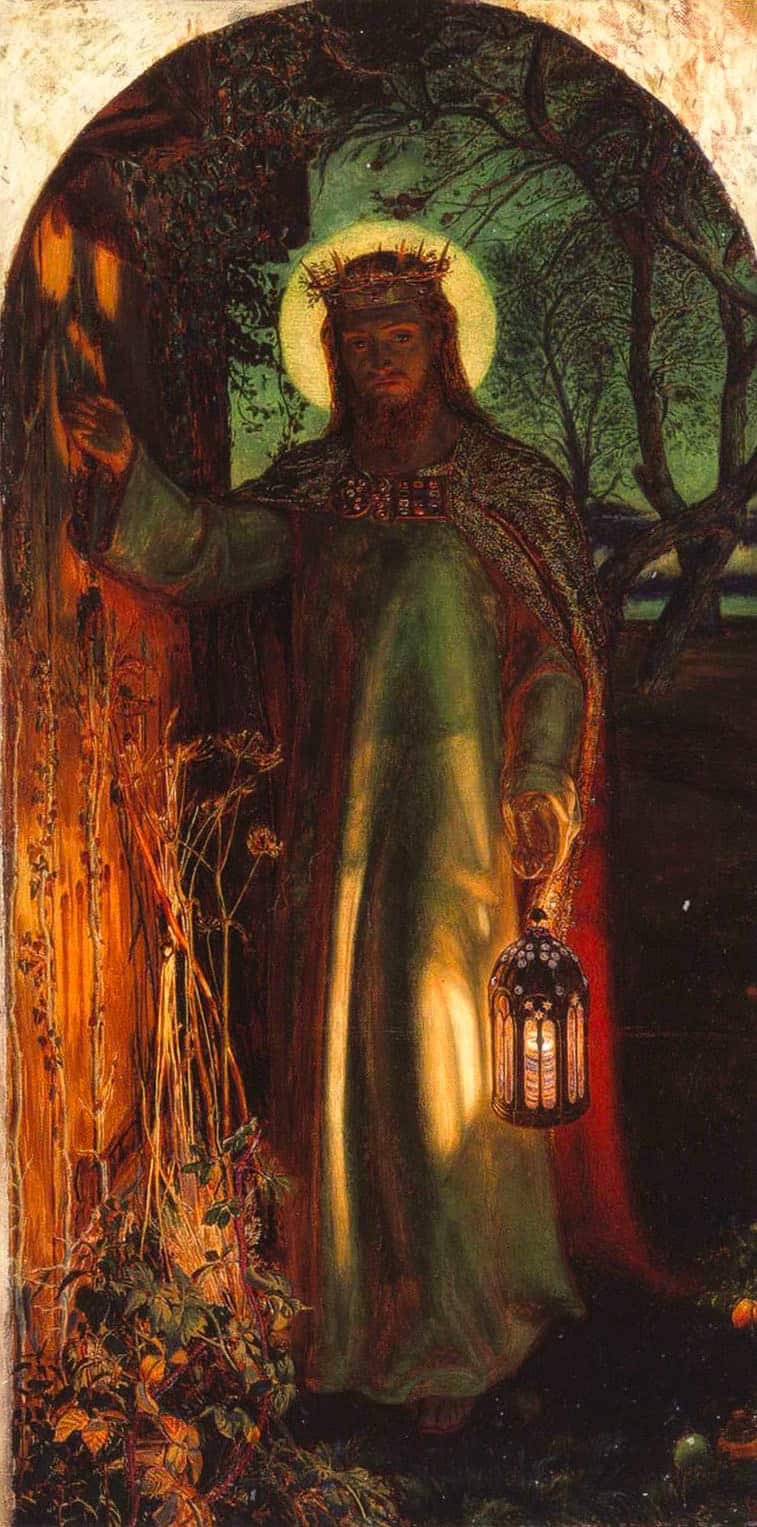
As November comes to its end and the last month of the year approaches, what comes to most people’s minds in our society is that the Christmas holidays are at hand.
The stores are already full of Christmas decorations and themes, radio stations broadcast Christmas carols and songs, and people are encouraged to buy presents for family and friends. “It’s the most wonderful time of the year” as the well-known song proclaims.
But what is actually wonderful about it?
First of all, what our modern secularized society has done is de-Christianize Christmas. In schools and public places it is much more common to hear “Happy holidays” than “Merry Christmas”. The explanation for this is that in a multicultural society as ours people from other religious (or non-religious) backgrounds may feel uncomfortable with the imposition of a Christian celebration on their lives.
The fact is that Christmas, despite the obvious overlapping of dates and some traditions with pagan religions, IS a Christian celebration. For Christians it is the celebration of God’s incarnation on this planet. That is the real wonderful news that Christmas conveys. All other notions of “a time to be reconciled and live in peace and harmony” are directly derived from the wonderful mystery that Our Creator emptied Himself of His glory and became flesh as the baby Jesus.
Moreover, Christmas is a season that comprises 12 days, from December 25 to January 5. The well-known English carol “The Twelve Days of Christmas” attests to this fact.
So we are not in the Christmas season yet. We are starting the Christian year with the season of Advent, a season that comprises four weeks.
The season of Advent is mainly a season of expectation and preparation for the mystery of Incarnation. As such, it may be thought of as a joyous time, but it also implies a penitential aspect that has often been overlooked in the last decades.
The readings for Advent, however, are clear in pointing out to us Christians that this is a time in which we need to “cast away the works of darkness and put on the armor of light” as the collect for this first Sunday of Advent says.
As we get ready to celebrate the wonderful mystery of God made flesh, we are also preparing to receive Him in our own lives, and look forward to a time when He will be the absolute ruler of the world.
This is the triple past-present-future perspective of Advent, which must in fact be the constant perspective in our lives.
But there can be no true preparation without purification. The rooms of our lives need to be decluttered and cleansed, if we are to receive Him who is light and life made flesh.
So let us take the reading of scripture seriously, pray, meditate, and do good deeds for our neighbors, so that with the aid of the Holy Spirit, we may leave behind what keeps us away from God’s love and from the love of one another. Only after we have tried our best to do so, can we come to the Christmas season with the genuine feeling that it is actually “the most wonderful time of the year.”
Fr. Carlos Expósito, Rector
|
RETURN TO TOP
King and Kingdom
This Sunday and Beyond - November 21, 2021
Get it in PDF form with calendar

On his own terms and in the divine freedom of his will, Jesus says, “My kingdom is not from this world.” Thus, he has a kingdom of which he is the king. In a sense, however, he is not the king of the Jews; rather, he is not the king merely of the Jews. He is king over everyone who belongs to the truth, which he himself is.
Pilate asks Jesus directly, “Are you the King of the Jews?” Jesus, seeming to evade, answers with a question: “Do you ask this on your own, or did others tell you about me?” No question put to Jesus will find an answer if the question is a trap. On his own terms and in the divine freedom of his will, Jesus says, “My kingdom is not from this world.” Thus, he has a kingdom of which he is the king. In a sense, however, he is not the king of the Jews; rather, he is not the king merely of the Jews. He is king over everyone who belongs to the truth, which he himself is, and he is king over those who listen to his voice. His kingship and his kingdom are ever secure, and thus he forswears violence. Jesus reigns supreme, high above all nations. (John 18:33-37).
“In the world you face persecution. But take courage; I have conquered the world” (John 16:33).In this world we expect trial and hardship, challenge and loss, persecution and bitterness of every kind. We expect to work by the sweat of our brow and bear the blessing of life in pain. We expect this and we face this, but not as those who are without hope. Our help is in the name of the Lord. Our help and hope reside in heaven, where victory and life and healing are assured.
Consider the Father and the Son and sacred flame of the Spirit in the mystery of heaven. “As I watched,” the prophet says, calling the reader and listener to watch and wait and wonder at the victory and power of God. “As I watched, thrones were set in place, and an Ancient One took his throne, his clothing was white as snow, and the hair of his head like pure wool; his throne was fiery flames, and its wheels were burning fire” (Dan. 7:9). Do we see the night vision? God Almighty! God the Ancient One! God forever and ever! Fiery flames and burning wheels!
There is a divine person who stands before the throne. “As I watched in the night visions, I saw one like a human being coming with the clouds of heaven. And he came to the Ancient One and was presented before him” (Dan. 7:13). In like manner, the author of the letter to the Hebrews writes, “For Christ did not enter a sanctuary made by human hands, a mere copy of the true one, but he entered into heaven itself, now to appear in the presence of God on our behalf” (Heb. 9:24). Jesus is our king precisely because of what he has done on our behalf. He has assumed our human nature; he has borne the crushing weight of evil and the sediment of guilt accrued over ages. He loved us and forgave us to the end. He loves us still, forgives us still, and is ever making petition on our behalf. In him, we are secure as the adopted children of God.
In the midst of life we are in death. But we may say with equal confidence that in the midst of death we are in life forevermore because we are in Jesus Christ. “Your kingdom come, your will be done, on earth as it is in heaven.” Moment by moment, the kingdom of heaven is being established on earth in the hearts the elect. The kingdom of God is within you. And in the final moment, whenever it may be, a cry will go out: “Look! He is coming with the clouds; every eye will see him” (Rev. 1:7).
Jesus Christ is the victorious king. Press on with hope and confidence.
Source: The Living Word ----- Picture: by Maerten Van Heemskerck Title: Ecce Homo
|
RETURN TO TOP
Confidence in the Midst of Tribulation
This Sunday and Beyond - November 14, 2021
Get it in PDF form with calendar
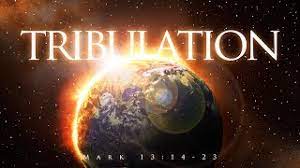
Last Sunday we celebrated the Feast of All Saints, and the common denominator among these persons, who were just ordinary people like you and me, but were chosen by Christ to be His life-giving witnesses on earth, was their great endurance of tribulation, and even martyrdom in most cases, thanks to their never-failing faith and confidence in Christ’s promise to be with them, upholding, guiding, and encouraging them against all sufferings, till the very end of time.
The writer of the letter to the Hebrews addresses a community of converts from Judaism, where there is constant clash with the traditional beliefs and practices, and in many cases they are persecuted, plundered, and even sent to prison for following Jesus’ New Way. The pressure upon these new converts was so great, especially because there was even division within the families, that some of them gave in and shrank back from Jesus’ Way of Love.
In our modern society, belonging to this or that religion, or to none, may seem a secondary matter to many. This is why it may not be easy for us to understand what it meant for a Jew to be excommunicated from the synagogue. It was like not belonging to the community anymore. The person was literally considered an outcast.
Remaining faithful and confident to the New Way for those people really demanded great courage, and also needed a lot of support from the new community. That is why the writer of the letter to the Hebrews praised those who gave solidarity and support to the ones who suffered persecution and prison.
As modern Christians, we usually do not have to undergo any kind of persecution or prison, and no one can deprive us of our material goods. There are still places in the world where this happens though, and people have been martyred for their Christian witness in countries where religious intolerance is still the normal practice.
However, we modern Christians are now facing what seems to be the greatest wave of religious indifference in society. Indifference may seem harmless, but it is the hardest obstacle to the spread of the Good News. This modern secular indifference is like an anesthesia that makes people be in a constant God-unconscious state of mind. And it is really hard to break through it.
This may lead us to doubt the worthiness of our message, or if it still makes any sense. The recent pandemic, which imposed so many restrictions to churches, was also a great blow against the spread of Christ’s Good News, but it also made us more creative and we had to reinvent our ways of being Christ’s Body for the world.
Doubt, fear, disillusionment, lack of confidence and faith, may have been and will sometimes be part of our feelings as we endeavor to carry out Christ’s salvific mission in this highly secularized world of ours. The Saints of all ages may have shared some of those feelings at some point, as they were engaged in their hard faith-sharing mission in the world.
But let us not fear, the task has been entrusted to us, not because we are remarkable or special, but because the Holy Spirit will certainly support and enable us.
As the writer of the letter to the Hebrews puts it, “We are not among those who shrink back and so are lost, but among those who have faith and are so saved.”
Fr. Carlos Expósito, Rector
|
RETURN TO TOP
An Uncountable Mulitude of Saints
This Sunday and Beyond - November 7, 2021
Get it in PDF form with calendar
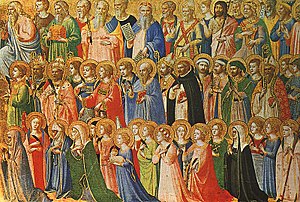
November the 1st is All Saints’ Day in the Christian calendar. It is a day dedicated to commemorating all those whose lives have been a significant witness of the Christian faith. Some of them are martyrs, others are not, but their lives are examples of commitment to Jesus’ radical Way of Love, and throughout the centuries they have served as paradigms to be imitated by those who want to be good Christians.
In our zeal to set the Christian mark high, we have somehow come to think that the chosen ones are just a few. After all, Jesus Himself said that “many are called, but few are chosen.”
It is a fact that being a follower of Jesus’ radical Way of Love consistently takes courage and self-denial. Jesus warned us that to follow Him we needed to take up our cross and deny ourselves.
His closest followers were not always able to live up to this requirement, especially not after he was taken prisoner to be tried. However, after His glorious resurrection Jesus enabled them, by the power of the Holy Spirit, to be His faithful followers and apostles.
This initial group, with the valuable later addition of Paul, was the core group around which other greater groups were formed, and the converts to the New Way were so numerous in a short span of time that they practically spread over the whole Roman Empire in a few years.
When the Emperor Constantine decided in the fourth century that the Christian faith had to be accepted in the Roman Empire, he might have been influenced by his converted mother Monica, but the main reason was the overwhelming number of Christian converts, even among the ranks of the Roman Army.
Being a convert does not necessarily mean that the person has the highest qualities that make this person a committed and exemplary follower of Christ. But every convert has the potential to become one.
The Book of Revelation in the seventh chapter has a scene depicting the faithful ones, the saints, before God’s throne. They are dressed in white robes, showing their purification, and they worship and praise God and the Lamb (Christ).
Even though the preceding scene had referred to God’s servants as taken from the twelve tribes of Israel, this may be seen as an allegory to Christ’s Church as the New Israel. The number used here is highly symbolic: 12,000 from each of the twelve tribes, which make up 144, 000 in all.
The word thousand at that time was used to refer to a huge number. For contemporary people, this may be hard to understand, and the idea of having 144,000 servants of God only that would be spared from destruction may sound like one hardly has a chance to be included.
But this scene is soon followed by another one in which the writer speaks of a great multitude from all nations, tribes, and languages that cannot be counted. The language here sounds much more inclusive, and there is no definite number given.
These are the ones that have gone through the great tribulation and have washed their robes white in the blood of the Lamb.
It is clear from this statement that these are the saints that are now in God’s and Christ’s very presence. They enjoy perfect communion with Them and with one another. They have had to face tribulations in their committed Christian lives, but Christ’s sacrifice on the cross—His blood --is what has enabled them to overcome all evil and temptations in the first place.
They are not a small group, but a multitude that cannot be counted.
As Christian converts, we may not be there yet, but we are all on the way.
Take courage, you may be one among the uncountable multitude the writer of Revelation saw before God’s throne. After all, Jesus has already done His part to make it possible. Just follow through.
Fr. Carlos Expósito, Rector
|
RETURN TO TOP
The Offering That Saves
This Sunday and Beyond - October 31, 2021
Get it in PDF form with calendar
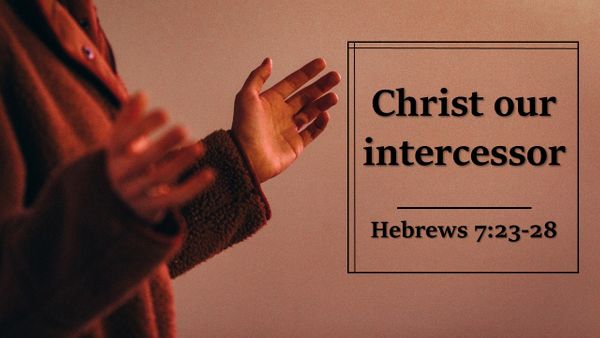
In Chapter 7 of his letter to the Hebrews, the writer further expounds his comparison between Jesus Christ as our Great High Priest and the high priests they are familiar with in Judaism.
The role of the high priests in Judaism was to offer sacrifices to God for their own sins and for those of the people to receive forgiveness for their trespasses. This was done in the Holy of Holiest (the inner sanctuary) once a year on Yom Kippur, the Day of Atonement. It was thought that the blood of the animals offered in sacrifice could, in some way, appease God’s anger towards the sinners.
Sacrifices and offerings (not always bloody ones—there were offerings of vegetables too) were also carried out by other priests throughout the year, not only as appeasement for sins, but also as thanksgiving for healing or any other blessings from God, or simply as a sign of thankfulness for the first fruits of a harvest.
The main role of high priests, however, was a sacrificial one to gain the remission of sins.
In this sense, the writer points out that these high priests had to ask God for their own forgiveness together with that of the people. They were chosen people, but still, they were sinners.
He also refers to the fact that they had to be replaced because of their mortality.
Jesus, on the other hand, has been raised from the dead and lives for ever in the heavenly realms. He is described by the writer of Hebrews in the following terms: “holy, blameless, undefiled, separated from sinners, and exalted above the heavens.”
Our Savior has no need to offer regular sacrifices, as the rest of the priests, simply because He did it once and for all when He offered Himself as a perfect living sacrifice on the cross.
As God’s Son, He is love incarnate, and the perfect gift of Himself was the offering that He made on the altar of His human life to show us all that the only worthy sacrifice that God willingly accepts from His children is love.
What could a loving God who created all that exists want us to give Him as an offering? Does He not own the whole universe, including us?
Any part of His creation that we try to offer Him is His already. And we are His beloved children created in His image and likeness.
God does not need to be appeased for our trespasses. His unconditional love is all-forgiving, and if we suffer as a result of our faults, it is only because we need to learn the lessons that will make us less self-centered and more caring for others.
In His perfect love, He has made us free, and that freedom implies responsible choices that will make us come closer to the divine image that has always been our true heritage. We are free to reject it, but this only brings us to the way of suffering, destruction, and the true death—separation from the ultimate source of life: God Himself.
All we have comes from God. Our imperfect love is but a pale reflection of God’s infinite love.
The only worthy thing we can do for our Creator is to spread His love to the rest of the creatures, especially to our fellow human beings.
Love is probably the only thing that is never diminished, but multiplied when it is freely given. It is not only multiplied but perfected every time it is offered in total freedom.
Our main purpose in life, then, is to offer our love, no matter how imperfect or small, as our free gift to others. By so doing, we are offering our Creator what He willingly accepts from us.
In imitation of His beloved Son, who offered Himself unconditionally for our sake, let us offer our love in concrete acts of kindness every single day and moment of our lives. This is the only offering that can help to save our lives and the life of the world.
Fr. Carlos Expósito, Rector
|
RETURN TO TOP
Time for Solid Food
This Sunday and Beyond - October 23, 2021
Get it in PDF form with calendar

In Chapters 5 and 6 the writer of Hebrews seems to be concerned at his readers’ lack of maturity in the Christian faith. He claims that they behave as if they were infants needing milk, unable to feed on solid food. And according to him, it is about time they should be able to process the more mature faith.
He bases his perception on what seems to be lacking among his addressees: the practice to distinguish good from evil.
He encourages them to move forward onto perfection, and not just the basic teachings of repentance from dead works and faith toward God.
Even so, he does not speak in derogatory terms and assures them that God will not overlook their work and the love they have shown for His sake. But he insists that in order to attain full salvation they must show forth in their lives diligence to realize the full assurance of hope to the very end.
In other words, what the writer of Hebrews is conveying in this section of his letter is that it is not enough to simply remain in the first stages of our faith in Jesus Christ. What Jesus Himself wants for us is to attain the full stature of the complete faith, and that requires diligence, and maturity.
What a mature faith implies is that the one who professes it thinks and acts accordingly towards God, towards one another, and towards the whole of creation.
That can only be achieved by carefully discerning good from evil, true life from death, what is life-giving from that which opposes life in any sense. In this distinction there can be no better compass that the law of pure love.
Our thoughts and our deeds must be guided by God’s unconditional love towards all His creatures. If what we have in mind serves love and life, let us put it into practice. Otherwise, let us reject it with all the force of our minds and hearts.
We need clear vision to discern good from evil. Blindness in this sense can be worse than physical blindness.
In the Gospel reading for this Sunday, what the “son of value” (Bartimaeus) wanted in his innermost depths the “son of the Beloved” (son of David) to do for him was to restore his vision. When Jesus asks him what he wanted Him to do for him, He was not asking an unnecessary question. It may even seem obvious on the surface. A blind man is coming after Him, so what else could he want?
But Jesus wants to elicit the innermost desire from his heart. He wants him to articulate his deep desire. And he does.
Just a moment before doing it, the blind man throws off his cloak, as if to get rid of his past values, and totally embraces Jesus’ love for him as the only real valuable thing. Jesus’ love restores his vision. And he responds by following Him on the way.
Will we ask our master and savior to give us vision again? Are we willing to start our solid diet on the faith, or do we still need the milk of infants?
Fr. Carlos Expósito, Rector
|
RETURN TO TOP
Approaching God's Throne Boldly
This Sunday and Beyond - October 17, 2021
Get it in PDF form with calendar

In his fourth chapter, the writer of the Letter to the Hebrews starts by referring to the Word of God. From what the writer says here, we cannot know for sure whether he is referring primarily to Christ, as the incarnate Word, or to God’s Word in a more general sense, or to both without making a dichotomic difference here.
The writer uses a singularly dynamic way to describe God’s Word. It is, foremost, a living and active word, not just something of the past to remind us how to behave properly. And it is sharp and piercing like a two-edged sword. There is no location in the physical or spiritual realms where it cannot reach and do its transforming work.
Although this depiction can apply to the Holy Scriptures, it is obvious that it may refer, and probably refers to God’s living Word in a much broader sense, probably including the Incarnate Word of God, Jesus Christ our Lord.
The fact is that right after this depiction of God’s living and active Word, he refers directly to Jesus, the son of God, as our great high priest, the one who has passed through the heavens. It is clear that for the Hebrew people the image of a high priest was perfectly familiar.
This high priest, however, unlike the ones in the Jewish religion, is not supposed to be in God’s presence just once a year—on the Day of Atonement—to offer propitiatory sacrifices for the sins of all. He had offered Himself as the actual lamb without blemish for the life of the world, once and for all, and is now sharing God’s presence in the heavenly realms.
But in spite of His divine nature and His being one with our Creator, Jesus is also the high priest who sympathizes with our weaknesses, our temptations, because He is totally human as much as He is totally divine. He suffered all our human limitations, weaknesses, and was probably tempted by the evil one much more than any other human being. But He came out victor.
No other heavenly King than our God--who knows us better than ourselves, not just intellectually, but because He became flesh as one of us--can feel as we feel and love us as we are.
As the gracious and all-loving God that He is, He allows us to come to His throne, not because we have earned this right by our good deeds, but through our trust in faith that He who loves us unconditionally will always be willing to give us the help we need.
Our loving Father and His Son--our Savior and Lord--are always ready to offer us, through the power of the Holy Spirit, all the help we need to overcome our weaknesses, our fears, our temptations, so that we can be full partakers in the inheritance of God’s reign of Love.
Let us then, with this assurance, boldly approach His throne, and obtain His gracious help on our path to becoming the true sons and daughters we are meant to be.
Fr. Carlos Expósito, Rector
|
RETURN TO TOP
Saved in Communion
This Sunday and Beyond - October 10, 2021
Get it in PDF form with calendar
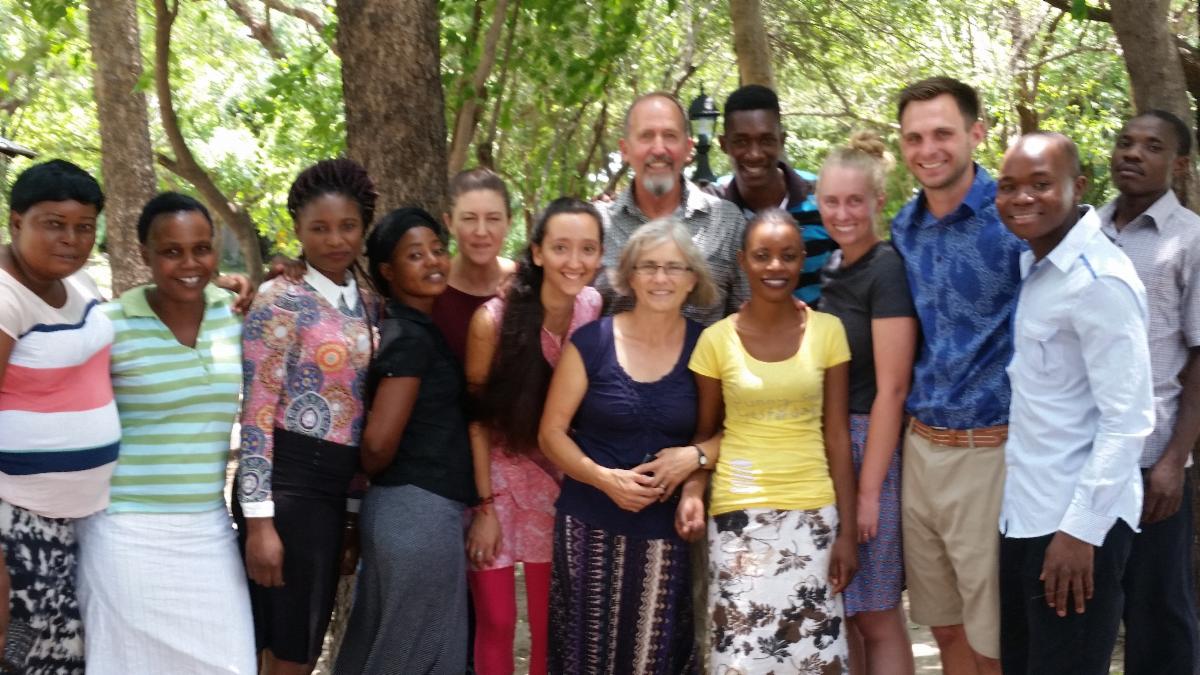
Most of us live or have lived in houses at a point in our lives. Those who do not have a house to live in know how miserable life can be when there is no place you can call home. And yet, even if we have a roof over our heads we do not always feel that is a place we can call home.
A house, unlike a tent, for instance, has a more permanent character. It is a dwelling place--a place where you stay for extended periods in your life and where you place the things you need in your own personal way. It is also the place you share with your beloved ones and where you can also learn the sense of community.
According to John’s Gospel, when Jesus felt His time to go back to the Father was at hand, He said to the disciples “In my Father’s House there are many places to live.”
Communion with our Creator, in this sense, was perceived by Jesus like living in the same house with Him. This communion was thus extended to all His children because He wants them to share it with one another as well.
In our modern western world, this image of a common house with a multitude of rooms might not be so popular any more. We would rather have Jesus say, “in my Father’s city there are many houses to live.” But that is not what Jesus said.
True communion with our Father cannot exclude our sense of communion with one another. And yes, communion implies breaking down our dividing walls and being willing to share common spaces of trust, mutual care, and confidence. This is not easy. It takes a lot of help from the Holy Spirit to move in this direction.
What we are used to doing is keeping ourselves separated from the rest, by not trusting anyone—or almost no one, by demanding that “our space” be respected, by living self-centered lives where we only include our closest family members and a selected group of friends, by lifting up walls of indifference and exclusion and pretending that each person must take care of themselves.
The writer of the letter to the Hebrews has a remarkable statement about houses. When he talks about Moses’ faithfulness to God, he uses the biblical expression “was faithful in all God’s house” meaning that he was faithful in the whole mission that God gave him.
When referring to Jesus, however, he acknowledges that Jesus was not faithful as a servant in God’s house, but as a son. Moreover, he affirms that Jesus Himself is the builder of the house, which gives Him greater honor.
And then, as a conclusion, the writer of this letter uses the most remarkable of all statements related to houses. He says we are the Lord’s house if we hold firm in the confidence and the pride that belongs to hope.
In what sense can we be God’s and Christ’s house?
In the sense of profound communion. Our Creator and our Savior both want to dwell in us. They want to come and make a common life with us all, sharing our joys, our sadness, our conflicts, our plights, our love.
But that can only happen in a communal sense. Notice that this writer does not say “we are His houses”, but “His house.” The same house is shared by all. We become the living structures where our God inhabits us in community.
The Apostle Paul had a different way to express it. He said we are “temples of the Holy Spirit”. The idea is quite similar, but Paul’s expression can be interpreted in a more individualized way.
What the writer of this letter is pointing to, however, is a communal way of making the presence of our Lord known to all through our confidence and hope in the Good News, and through the actual living out of this hope in which we share the wonderful news of salvation with one another in the biggest of all houses: God’s House of Love.
Fr. Carlos Expósito, Rector
|
RETURN TO TOP
Saved in Communion
This Sunday and Beyond - October 3, 2021
Get it in PDF form with calendar

That humans have been created to live communally is self-evident from history itself. Even the most remote ancestors of contemporary humans lived in groups, which has been attested by all archeological discoveries.
Living in communities is not a prerogative of humans. Many other living creatures on this planet share this trait. But the degree to which this communality has shaped the human species, giving rise to culture and civilization, has never been attested in any other living beings.
Humans not only live communally with one another, but engage in relationships with several other living species, which has also contributed to their development and present-day privileged position in the evolutionary scale.
The story in Genesis 2 recognizes the need of humans to relate to the rest of the living species, particularly with the animal kingdom, but it also recognizes the fact that the ideal partner for a human being is another human being—someone with the same kind of bones and flesh, but at the same time distinctly different in certain attributes, which make this union one of complementarity rather than one of sameness.
This kind of loving union that drives two distinct persons to come together physically as one, and which may also be the source of new life, is blessed by the Creator.
By so doing, our Creator is reminding us humans of our basic need to share the love we have received from Him. Love is not meant to be kept inside us as in a receptacle. Love can only manifest itself as an abundantly shared gift with others.
The basic core of the family, which is the cell of human communities, is this loving union of two persons. When this core functions properly, i.e., when it is actually based on mutual love, it will pass on this love to the offspring or adopted children, to the more extended family, and to the whole of the community. Eventually, it will affect nations and the whole world.
It is based on this sharing of humanness in love that the author of the Letter to the Hebrews clearly presents his idea that Jesus is our true High Priest precisely because He, who is also perfectly divine, in His humanness became one like us, and through His sacrificial death was able to defeat death and the powers of evil so that we may be saved.
It is through this shared loving humanness that He also constantly helps us to overcome temptations and suffering and be saved by God’s Grace. He who suffered these temptations and overcame them in His human flesh, is the ablest one to help us conquer them.
Mark’s Gospel text for this Sunday brings a hard topic. The topic of divorce.
Given the fact that nowadays people do not hesitate to end the union of marriage by divorce when they sense “it no longer works for them”, it is understandable that texts like these are not popular anymore. However, the fact is that this matter was as controversial in Jesus’ time as it is in our present-day society. It is due to its controversial character that the Pharisees decide to bring it to Jesus.
What Jesus replies to the question about the lawfulness of divorce, based on Moses’ commands, clearly shows that Jesus’ view is based on the same Genesis story that appears in Chapter 2 of that book.
Jesus stresses the idea that in this loving union the two persons are no longer two, but one, and that a union that God Himself has blessed should not be broken by mere human laws.
These matters are not simple, and each particular case needs to be looked at with great loving care and compassion.
Our attitude, as Christians, should not be one of total intolerance to the fact that for some couples it can do more harm than good—even to their family--to remain together in a marriage union. On the other hand, the liberality and superficiality with which divorce decisions are taken at present is not in harmony with the mind of Christ.
Preserving the union of married couples whenever possible must be the prevailing attitude. After all, no true loving relationship can survive without mutual forgiveness and understanding.
If forgiveness and mutual tolerance are not fostered in the core relationships of human beings, how can God’s unconditional love be expressed in the whole of society?
First things first. The core union of two persons is the starting point. It is the elementary school where most humans learn to love another human being, despite their differences and mutual hurts. If these elementary grades are passed successfully, we can then start to expand our love to family, neighbors, classmates, co-workers, fellow church members, and the rest of society. Then we will have learned how to express Christ’s love for all, and in this loving communion we will all be saved.
Fr. Carlos Expósito, Rector
|
RETURN TO TOP
Exalted in Humbleness
This Sunday and Beyond - September 26, 2021
Get it in PDF form with calendar

In the Fourth Chapter of his letter, the Apostle James reminds his readers (and us today) that the only way to be exalted by our Creator is by submitting ourselves to His will and purposes for us.
What God wills for us is that our lives become one with Him and with one another in a loving communion where justice, harmony, and healing abound; and divisiveness, selfishness, and exclusion have no place.
In order for this to be possible our lives must be lived in alignment with our Creator’s life-giving purpose.
The forces of evil, both from this world and the invisible realms, have only one purpose: to oppose God’s plan of total reconciliation by enticing us humans into ways that make us self-centered, caring only for our own satisfaction and lowly desires, and using our fellow human beings and the rest of creation as the means to attain them.
In the end, the sad truth is that the attainment of these desires will never give us complete satisfaction. There is a deep thirst in our souls for the true life--the abundant life that can only be attained when the purpose of our life turns outward, toward the satisfaction of those who are in need.
The need can be both material and spiritual, and when we find our greatest joy and satisfaction in supplying this need to others, we begin to share in God’s loving nature which was revealed to us in the person of Jesus Christ.
This will require that we stop judging others’ behaviors, as if we were the makers of the Law, and focus more on aligning our thoughts, our attitudes, and our deeds with the Father of Lights. No law is more perfect than the law of love, which is stated in the Gospels as a summary of two different commandments from the Old Testament: the love of God, and the love of our neighbors.
Put together, these two aspects are totally coherent with God’s reconciling plan for us. We love our Creator out of pure gratefulness for our creation, preservation and all the blessings we constantly receive from Him in our lives. When we recognize God’s infinite love for us, our natural response is to love Him. But the concrete way this love can be shown in our lives is in our relationships with others.
We human beings have been created to live in relationship with our Creator, with one another, and with the whole of creation. We are not separate islands. When we harbor the illusion that we are self-sufficient entities, we are under the influence of the Adversary—the evil one that wants, above all, to separate us from God’s life and love.
As soon as we recognize our total dependence on our Creator and our loving co-dependence with one another, we start to be back on the right track. We acknowledge our humbleness before God, and then we begin to be filled with His Holy Spirit—the Spirit that fills us with abundant life and truth.
Fr. Carlos Expósito, Rector
|
RETURN TO TOP
Faithful to Our True Self
This Sunday and Beyond - September 19, 2021
Get it in PDF form with calendar

In his letter, James the Apostle keeps on warning his readers about the greatest dangers that can deviate them from the true path of abundant life and eternal salvation.
In Chapters 3 and 4 he contrasts the true wisdom coming from above with the worldly wisdom that leads people to all sorts of disorders and wickedness. He depicts the former as “pure, peaceable, willing to yield, full of mercy and good fruits, without a trace of partiality or hypocrisy.”
When referring to the latter, however, he describes it as the source of envy and selfish ambition, and the cause of the conflicts and disputes that give rise even to murders and wars.
James makes clear that the reason why we do not obtain what we ask God for is simply because we ask the wrong things. We covet others’ possessions and only want to satisfy our selfish pleasures.
When the worldly knowledge we gain is used only hedonistically, i.e., for the sole satisfaction of self-centered pleasures and interests, our lives stray away from the true source of life—our Creator—and our spirits languish and are stifled by our unfaithfulness to the true purpose of our lives: to bring forth the beams of God’s unconditional love in the world.
It is precisely in this sense that James uses the phrase “friendship with the world” as an equivalent to “enmity with God.” In this context “the world” is not seen as God’s creation, which the first Book of the Bible clearly calls “good, and good indeed”; what the term means here is the societal practices that make human beings behave as selfish competitors that only care for their own good, and perhaps the good of those who can be of use to them.
Seen in this perspective it is clear that such attitudes are opposed to God’s plan of inclusive and life-giving love for all, which began when he infused of His own breath or spirit within each of us.
Our true self is this life-giving breath—this love that wants nothing but to give love. If jealousy could be given a positive connotation, then we could say, as James did, that “God jealously yearns for this spirit that he has made to dwell in us.”
Commentators and biblical scholars have not been able to locate the passage in the Bible where the quotation above is taken from. Some have said it is based on an extra-biblical source. The fact is that in the Book of Genesis God breathes His own spirit into the first human creature, so even if this quotation is not correct, the idea remains valid.
James is aware that not following the self-centered yearnings that the world prompts us to heed can be really hard. It is a task that we could not undertake by our own efforts only. So he reminds us that God’s grace will be abundantly given to the humble.
This time James quotes from the Book of Proverbs:
“God opposes the proud,
But gives grace to the humble.”
Prov. 3: 34
This is perfectly in line with the message that this Sunday’s Gospel reading according to St. Mark brings us.
Even though Jesus was clearly telling His disciples about His final days of betrayal, death, and resurrection, they miss the whole point of what He is saying and idly waste their time and words arguing about which of them was the greatest.
It is then that Jesus takes a little child in His arms and declares that whoever welcomes one such child welcomes Him and the one who sent Him.
In Jesus’ society, and even in today’s society, children are the least valuable persons from a utilitarian point of view. They demand a lot of time and work and give no material gain in return. So they are only considered valuable as the potential adults they would become.
This view is totally opposed to God’s unconditional love. Children are loved because they are human creatures, and all human creatures are the living image of the Creator on earth. As such, we all deserve love from the very moment we are born.
If we are able to be in tune with this great truth, then we have certainly started to become like Christ: we are being faithful to our true self, and the wisdom from above is dawning on us.
Fr. Carlos Expósito, Rector
|
RETURN TO TOP
Faith with No Partiality
This Sunday and Beyond - September 12, 2021
Get it in PDF form with calendar

Again, this Sunday brings us to the reading of James’ Letter. This Sunday the Apostle brings out another controversial theme: the partiality that some of those who claimed to be followers of Jesus Christ showed towards people of different social and economic status.
James is radical in his statement: “if you show partiality, you commit sin, and are convicted by the law as transgressors.”
Treating people differently according to their wealth or social standing is seen by the Apostle as contrary to what he calls the royal law of Scripture, “You shall love your neighbor as yourself.”
Jesus Himself had used this statement as the second part of his summary of the Law and Prophets, i.e., of the whole of Scripture.
In fact, Jesus had always pointed out the need to show forth our true love of God by imitating the Heavenly Father who loves us all unconditionally and even makes the sun come out both for the just and the unjust.
In Jesus Christ, who is the perfect human image of our Creator, there can be no partiality. The only partiality Jesus ever showed, if any, was in favor of the dispossessed and the outcast, not because He found them intrinsically superior, but because they were the ones who suffered the most in the society of their time.
The Apostle James not only insists that true followers of Christ must treat their fellow human beings with equity, regardless of their social status, but that as Christians we need to provide not only for the spiritual but also for the material needs of the dispossessed in this world.
He gives clear examples of how hypocritical it would be to send someone who is poorly clothed and hungry out, simply with the wish that they would be warmed and filled, without actually providing them with the substantial things they need.
This also reinforces what James had already brought out in the first part of his letter, that there can be no real Christian faith that is not shown forth in the acts of our lives. Hence his statement that “faith by itself, if it has no works, is dead.”
This statement does not in any way deny the crucial role that faith plays in the lives of all Christians. It does not mean that our works only will justify us before God. What it does mean is that a faith that does not move the faithful to do works that help those who are in greater need is a fake faith, which would be tantamount to no faith at all.
If we, as followers of the Lord of the Way of Love, are to show any kind of partiality, it should be a reverse partiality: one that moves us to show greater loving care for the ones who suffer, for the sick, for the needy, for the outcast.
This will clearly show forth the works of our true Christian faith.
Fr. Carlos Expósito, Rector
|
RETURN TO TOP
Doers of the Father of Lights' Word
This Sunday and Beyond - September 5, 2021
Get it in PDF form with calendar

In the first chapter of the Letter of the Apostle James we find the definition of what he conceives as the true faith that Christ’s followers must show forth in their lives.
Sixteenth-century reformers and their followers contrasted what was seen as a deceitful practice of the Roman Catholic Church of the time, with its great emphasis on charitable works and donations to achieve salvation, with Paul’s clear statement of salvation through justification only, achieved through our faith in Jesus Christ and His once-and-for-all sacrifice on the cross. They also quoted Saint Augustine on the same subject.
The present-day churches that inherited the Reformed tradition—including the Anglican Church—have also adhered to the doctrine of justification by faith only. There are different ways of interpreting this statement though.
What the doctrine of justification by faith implies is that we, as finite human beings, are not able to achieve cleansing of our sins by our own efforts only, no matter how hard we try. There is no way we could stand justified before God by our own doing. It is beyond our capabilities.
What the above-mentioned doctrine makes clear, then, is that we must with all humbleness accept that it is God who has taken the initiative to make us undefiled again, and that in the fullness of time this has been carried out through His Son’s sacrifice on the cross.
What the Apostle James makes clear in his letter does not really contradict that justification is given to us as a graceful gift from God. In verse 17, James states, “every generous act of giving, with every perfect gift, is from above, coming down from the Father of lights.” That means that every authentic good work we do is but a reflection of God’s perfect gift from above, and has its true origin in Him.
He calls this great gift “the implanted Word that has the power to save your souls.”
Then James points out how useless it would be just to be hearers of God’s Word, if we do not put that Word into practice in our daily lives.
He mentions those who think of themselves as really religious people, but are not even able to bridle their tongues. And he ends this section by asserting what the true religion should be: to care for the orphans and widows in distress, and to keep oneself unstained by the world.
Refraining from evil doing and practicing good works that show our loving care for one another are like two sides of the same coin that aligns our lives with God’s will for us.
As Christians, we must always with meekness acknowledge Jesus’ salvific grace bestowed upon us freely, out of pure and unconditional love. At the same time, we need to be aware that our lives must clearly show, in our actions, the caring love for one another that He has shown for us.
Fr. Carlos Expósito, Rector
|
RETURN TO TOP
The Battle Within
This Sunday and Beyond - August 29, 2021
Get it in PDF form with calendar
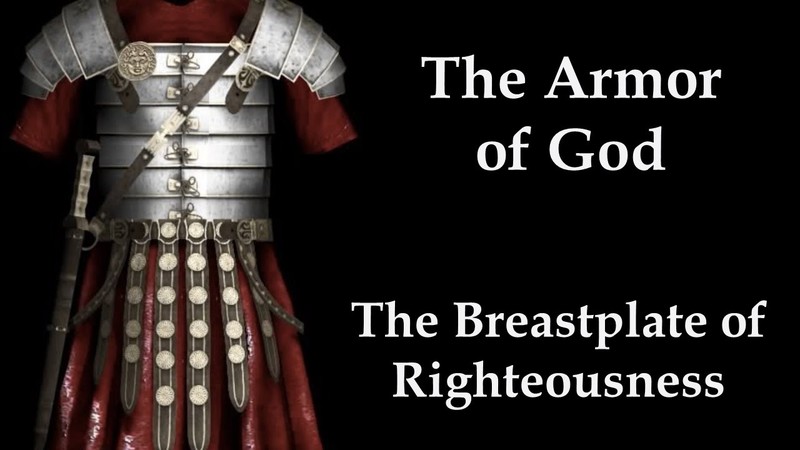
In Chapter 6 of his letter to the Ephesians, the Apostle Paul acknowledges that the main battle that Christ’s followers need to fight is not against earthly forces, but against spiritual ones.
He defines these enemies as rulers, authorities, cosmic powers, and spiritual forces of evil in the heavenly places. The language used by Paul may be somewhat mystifying for contemporary readers, but one thing is clear: these are forces that we cannot fight against in the outer physical world, but in the inner world of our souls.
Then Paul cleverly uses the image of the Roman soldier’s armor to make his readers understand the spiritual graces that Christ’s followers must strive after, in order to be well entrenched against the attacks of the evil one.
His list includes the belt of truth, the breastplate of righteousness, the shoes of readiness for the proclamation of the Good News, the shield of faith, the helmet of salvation, and last, but certainly not least, the sword of the Spirit, which is the Word of God.
At the same time, Paul urges Christ’s followers to pray in the Spirit at all times, and to keep alert and always persevere in supplication for all the saints, including him.
It was clear for Paul, as it should be for us all, that there is no individualistic way of keeping safe from the attacks of the evil one. It is precisely the tendency to become self-centered that evil forces use most easily against us, to deviate us from Christ’s all-inclusive Way of Love.
What that means in practical terms is that no matter how well we attire ourselves in God’s armor, our intentions in prayer and action must always reflect Christ’s love for all, or else, we will become the easy target of the evil one.
Prayer is powerful, and we Christians have no doubt about it. There is nothing wrong in making petitions to God for ourselves, if they are in line with God’s loving will. However, our prayer practice, if it is to be truly Christian in nature, must always include intercessions for others in need.
In this Sunday’s Gospel reading according to St. Mark, Jesus points out the Pharisees’ and scribes’ hypocrisy when they insist on the need to keep the practices of ritual washing of all food and other objects, and condemn Jesus and His disciples for not following the practice strictly. They claim that the disciples eat “with defiled hands”.
Jesus’ response is radical indeed. He makes it clear that the things that enter a person cannot defile that person, but it is what comes from inside the person, that is to say, the evil intentions that live within, that really defiles human beings, and cause all the evil in this world.
Jesus’ message here, although with a different intention, is quite akin to Paul’s. Both point to the fact that the origin of evil is inside us, and it is inside us that the main battle needs to be fought.
It is a hard battle that cannot be won by opposing with more of the same, as in the battles that are fought on earthly battlefields, but by intentionally filling our inner lives with the spiritual graces with which the Holy Spirit is more than willing to fill us with, if only we ask.
Fr. Carlos Expósito, Rector
|
RETURN TO TOP
Subjected to One Another in Love
This Sunday and Beyond - August 22, 2021
Get it in PDF form with calendar

In Chapter 5 of his letter to the Ephesians, the Apostle Paul refers to the need of being subjected to one another out of reverence for Christ.
Verses 21-23 reflect what Paul sees as the way husbands and wives should relate to one another in this new Way of Love. These verses have been the focus of much controversy in the last few decades, mainly because of the way they depict the relationship of a wife to her husband as subjection. “Wives, be subject to your husbands, as you are to the Lord”, says Paul.
Feminists and, in general, women who for decades have struggled to gain equal rights for them in society are not fond of these words. They seem to point to a kind of relationship where men are above women.
In fact, they do. We cannot pretend that Paul’s mindset was not a product of his society. His was a strongly patriarchal society, even more so in Israel than in the Roman world.
Women in the Roman world had certain rights that were unheard of in the Jewish world. They were able to express their ideas more freely and, in fact, talked a lot in the congregations. They also had power and influence in their household and in the broader society. This must have seemed offensive to Paul, and he was trying to make the point that women should behave in a more Jewish-like manner in the Christian congregations.
But what Paul was pointing to really goes beyond mere societal conventions. When he speaks about the way husbands must behave towards their wives, he clearly states they must treat them with the same kind of love Jesus treats His church.
After all, what Jesus did for His church is the greatest subjection one can think of. He did not demand that the Church obey Him as a tyrant. Instead, He gave His own life for the Church, for the Assembly of the saints, and for those who would follow afterwards.
Paul compares the union of Christ and the Church with that of husband and wife. He speaks about a mystery here, referring to the verses in Genesis that speak about the union of both as becoming “one flesh”. The logic Paul uses then is that the husband must love his wife as much as he loves his own body, since they are but “one flesh”.
This passage has been put aside by many congregations in their lectionaries due to the reasons stated above.
It is easy to understand why contemporary women, and men who defend women’s rights, may find it offensive. But we may lose sight of the forest by looking at one particular tree only. It is essential to notice the opening verse in this section: “Be subject to one another out of reverence for Christ.”
As much as Paul, consciously or not, reflects his patriarchal way of thinking here, his main intention goes far beyond.
He is urging the new converts at Ephesus to relate to one another in such as way that clearly shows forth their new birthing in Christ. When we are born anew in Christ, we become members of a new kind of family, in which people relate as servants of one another, in the sense that they are always willing to serve them lovingly, as Christ serves us.
In a community based on Jesus’ radical Way of Love, this kind of relationship must also be reflected in the bond between love partners, because this bond constitutes the core from which all family relationships stem, reaching out to the broader family that constitutes the Holy Assembly of the saints.
Fr. Carlos Expósito, Rector
|
RETURN TO TOP
BLay Aside Immaturity and Live
This Sunday and Beyond - August 15, 2021
Get it in PDF form with calendar
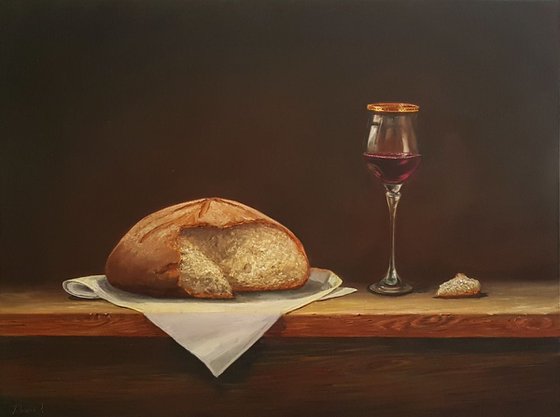
What the readings for this coming Sunday point to is clearly the need to grow in wisdom--the true wisdom coming from above, the one that enables us to discern God’s will for us, and to attain abundant and everlasting life.
The Book of Proverbs refers to wisdom in a personified way—a feminine person. She invites all, especially those who are simple, and even those who have no sense, to come and eat of her bread and drink of her wine freely. Her intent is to change the miserable lives of those who are misled by their self-centered delusions and debaucheries into lives which are worth living, because they have a purpose and an insight. The purpose, even if not explicitly stated in the passage, is to do God’s will.
It is worthwhile noticing how the bread and wine are used as symbols of the spiritual nourishment that wisdom constitutes for those who willingly want to feed on the knowledge of God.
Bread was the commonest type of solid food for most people in the Mediterranean World of that time. In most cases, the word bread was used to refer to food in general, as it is still used in our contemporary world. And wine was a common drink for those people as well. The cultivation of grapes and the making of wine were common activities of the day.
It comes as no surprise then, that Jesus Himself used these two elements as representing His body and blood during the last supper with His disciples before He suffered death.
In his letter to the Ephesians, the Apostle Paul insists that Christ’s followers must no longer live in an unwise way, but wisely, and discern the will of the Lord. He warns them against the foolishness of falling into addictions such as drunkenness, which only temporarily seem to please their senses, but eventually lead to destruction and death. Instead, Paul encourages the new converts to engage in activities that lead them to be filled with the Holy Spirit, such as the singing of hymns and psalms, and a grateful attitude towards God throughout their lives.
What Paul said then is still more than valid today. Perhaps even more so.
Today’s world is full of futile entertainments enticing us to engage in activities which only selfishly please our senses for a while, and end up debasing our human nature, which ought to reflect the image of our Creator instead.
When our lives are so vainly and foolishly self-centered, we lose our insight and purpose in life. We make Christ’s redeeming sacrifice on the cross futile for ourselves, and for those who are consciously or unconsciously affected by the way we live.
Jesus urges us to feed on Him, to make His life our own, symbolized in the eating of His flesh and the drinking of His blood, as the constituents of His whole being. True wisdom is embodied in Jesus Christ Himself. So by feeding on Him we partake of this infinite wisdom, the wisdom coming from God. This is the wisdom that can really transform foolish and wasted self-centered lives into lives full of purpose and insight, into abundant lives to be shared in loving care with all those who surround us, into lives that shine with God’s light, and transcend all limitations of time and space: real lives.
Fr. Carlos Expósito, Rector
|
RETURN TO TOP
Be Angry but Do Not Sin
This Sunday and Beyond - August 8, 2021
Get it in PDF form with calendar
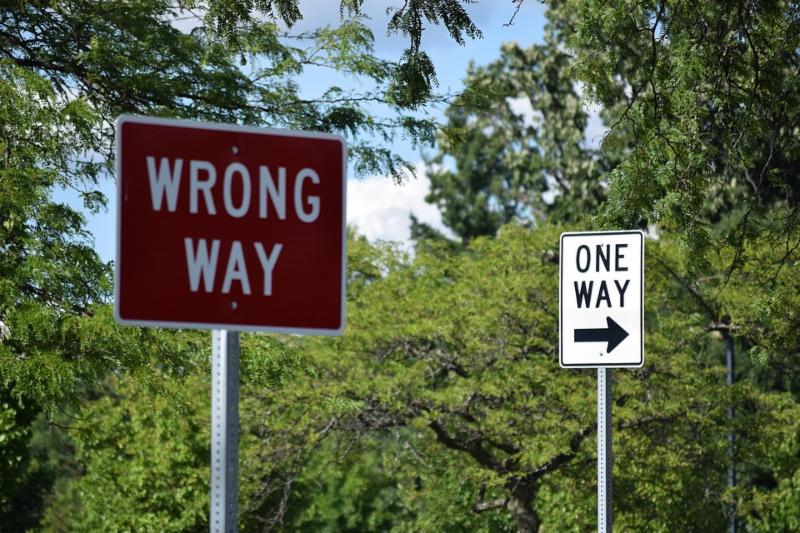
Is anger an anti-Christian feeling?
Good question. But let us begin by reading what the Apostle Paul states in his letter to the Ephesians, Chapter 4, verses 26-27: “Be angry but do not sin; do not let the sun go down on your anger, and do not make room for the devil.”
Notice that Paul does not tell the people at the church in Ephesus not to be angry. In fact, he admits that being angry is part of the Christian way. “But do not sin”, he adds.
How can one be angry and not sin? It would seem that anger makes us lose all control, and when that happens we may destroy things or even harm others, including our loved ones.
This is what happens when we let anger overtake us completely. If we ruminate over personal offenses and let vindictive thoughts fill up our minds for an extended time, the likely result will be that we lose all control at some point, and leash out to the offender, or, even worse, to the innocent ones. This is what Paul means when he warns us not to make room for the devil.
He also wisely says, “Do not let the sun go down on your anger.” This is a warning against letting our minds be filled with the angry feeling for long periods of time. We need to let go and occupy our minds on constructive and loving thoughts instead. Otherwise, our anger may be a convenient open door to the evil one.
Jesus Himself showed anger at some point in His ministry. One example everyone probably remembers is when He overturned the tables and cast out the merchants at the temple. The reason He felt anger was because He realized that the original intention of the temple as a place of worship for God had been twisted by these practices. His anger was not directed against these people in particular, but against the practice that had become the norm of the day. He did not hate these specific people, but the business that took place at the place of worship.
Feeling angry on the face of injustice done to our fellow human beings is in fact a Christian virtue. Being indifferent to injustice makes us accomplices of it, and allies of the evil forces.
The way we channel our just anger is vital though. When people protested peacefully after the atrocious murder of George Floyd, and demanded that justice be done and no more acts like these be repeated, they were channeling their anger in the proper way. That was perfectly in line with the Christian way.
However, when riots broke out, police cars were overturned and burned, police officers injured and killed, and businesses were ransacked and destroyed, they were doing what Paul describes as “making room for the devil.”
As Christians, we must not always align with what goes on in the world. There is a lot of inhumanity and injustice in this world, and if it does not make us angry and we do not raise our voices and try to do something about it, how can we claim to be followers of the One Who overturned the tables at the temple?
Feeling just anger, however, does not give us permission to attack or hurt others. Jesus never did that, not even when He was unjustly accused, arrested, tried, and condemned to death. He had followers who could have defended Him with weapons, but He never incited them to do so.
The teachings of Rev. Martin Luther King Jr., a man who had deep Christian formation and convictions, give us the clue as to which path to follow. He raised a powerful and unstoppable movement for the civil rights of the black people, but he constantly insisted on the use of non-violent forms of protest and demonstration.
He was killed, but his movement achieved tremendous and lasting changes in American society, making it more just and equitable for all.
The answer to the question with which we started is: No, anger is not an anti-Christian feeling per se. In fact, anger on the face of injustice is a Christian virtue. But the way we channel it does make a difference. We need to use it as a non-violent weapon to make positive changes in our world, but we should never allow the evil one to feed on our anger in order to make his destructive power even greater.
Fr. Carlos Expósito, Rector
|
RETURN TO TOP
No More Hunger and Thirst, but First…
This Sunday and Beyond - August 1, 2021
Get it in PDF form with calendar

Eating and drinking water are two essential needs for most animals, including us humans, to stay alive and healthy. Throughout the ages, the urge to satisfy these two needs has been both an incentive and a plight of civilization. It has made possible the advance of technology to produce more food and provide water reservoirs, but at the same time the inequalities among the different strata of society have widened the gap between those who have plenty, even too much of both food and water, and those who have a scarcity or even a total lack of both.
Having access to food and water was a problem for most people in Jesus’ times. And it is still a problem for a lot of people in third-world countries, even for some people in the most advanced societies, like our own. It has been predicted that unless we do something serious about the ongoing environmental deterioration, access to drinking water will become a major issue for the world in the decades to come.
If someone found a solution to the hunger and thirst of these large masses of people, that someone would be solving a major problem in this world. What analysts of the situation have been saying is that some regions need to develop their resources tremendously for this to happen, and that world-wide cooperation is much needed in this respect.
The multitude that Jesus fed in the wilderness got the impression that they had found someone who could solve their hunger problem for good. They were so impressed by the wonder of their abundant feeding that they wanted to stick around Jesus, and probably make Him a king. They did not realize that Jesus’ mission had a much wider scope. It was so wide that it could not be grasped by human standards.
When we become the slaves of our immediate biological needs, we stay at the animal level. Unfortunately, there are people in this world that have not been given the opportunity to move beyond that level, mainly due to the lack of compassion and solidarity of those who have the means to help them.
But there are people who do not want to move out of that level, even when they could. The people who Moses led out of servitude in Egypt through the wilderness towards the promised land were always complaining of the lack of enough food and drink. They even missed the abundance they had when they were slaves. God knew their weakness and provided them with meat and bread. But the mere satisfaction of immediate hunger and thirst will never make us free to be fully human, and a true image of the divine.
There is a hunger and thirst that has been implanted in the deep recesses of our being by the Creator Himself. It is the hunger and thirst for God. This is what constantly drives us to becoming what we already are, a beloved creature of God, a creature made into His likeness and image, with an enormous creative and loving potential that will enable us to solve the real hunger and thirst in this world. Only by becoming like Christ can we satisfy this deep hunger and thirst.
In his letter to the Ephesians, Paul urges his readers to clothe themselves with the new self, created according to the likeness of God in true righteousness and holiness.
As long as the forces of this world remain self-centered, there will always be people who go hungry and thirsty. Only through a deep change of conscience that leads us all towards an awareness of our intrinsic unity and equality in terms of rights and dignity, can a real change be made that will put an end to this scarcity and lack.
But the only way this will happen is if we all feed on the Bread of Life first, on Him Who will satisfy our innermost hunger and thirst for the true God, the God that will make us free of our egocentric bonds and expand our conscience to embrace all our fellow human beings, all of creation, in a joint effort to do away with the hunger and thirst in the world.
Fr. Carlos Expósito, Rector
|
RETURN TO TOP
Growing Up Together into the Full Stature of Christ's Body
This Sunday and Beyond - July 25, 2021
Get it in PDF form with calendar

In chapter 4 of his letter to the Ephesians, the Apostle Paul exhorts the recipients of the letter to be united in the faith they have received through a common Baptism, and to show forth the calling they have received through Jesus Christ in their daily lives, and especially in their common lives as the Holy Assembly.
Paul recognizes five main gifts that the one Spirit gracefully concedes to each faithful follower of Jesus’ Way. These are the gifts that, when properly exercised and put to the service of others, can make us all gradually grow into the full stature of Christ’s Body, which is the fullness of the Church.
As Paul declares, some are apostles, some prophets, some evangelists, some pastors and teachers. All of these functions are essential, and the Spirit wisely gives each person the gift to exercise one of these with excellence. It does not mean that each of us should excel in each of these functions, but that we naturally excel in one of them—even if we have not noticed it--and perhaps try hard to exercise the rest if the need arises.
The practical implication of this statement is that none of us separately is equipped with all it takes for a healthy church to develop into the true Body of Christ. It takes loving cooperation and a true united effort to put our gifts at the service of the community if this growth is to take place.
As much as we like to call ourselves the Body of Jesus Christ, the fact is that the Church on earth is in a constant movement towards becoming this Body, with more or less success in the intent. But this is not a goal that some clever people who lived centuries ago have set up. It is Christ’s goal, and the Holy Spirit is always leading us towards its attainment.
All we do is lend the Holy Spirit a hand, and by developing and exercising the specific gift that we have been given, and working in loving harmony and close cooperation with the rest, a lot can be achieved towards Christ’s goal of building up His Body in love.
As Paul warns us, it is no longer the time to act unwisely and immaturely, letting others lead us astray with every kind of false doctrine and deceitful scheming. It is God’s truth that must be spoken in love, and the Holy Spirit is the one who will undoubtedly guide us to that truth.
Paul insists that with all humility and gentleness, with patience and loving kindness, making every effort to maintain the unity of the Spirit in the bond of peace, each of us diligently exercise the special gift the Spirit has bestowed on us, putting it at the service of the community.
Through this, the time will come when we will all reach the full stature of Christ’s Body, and actually become His Church for this needy world.
Fr. Carlos Expósito, Rector
|
RETURN TO TOP
How Many Loaves Have You? Go and See.
This Sunday and Beyond - July 18, 2021
Get it in PDF form with calendar
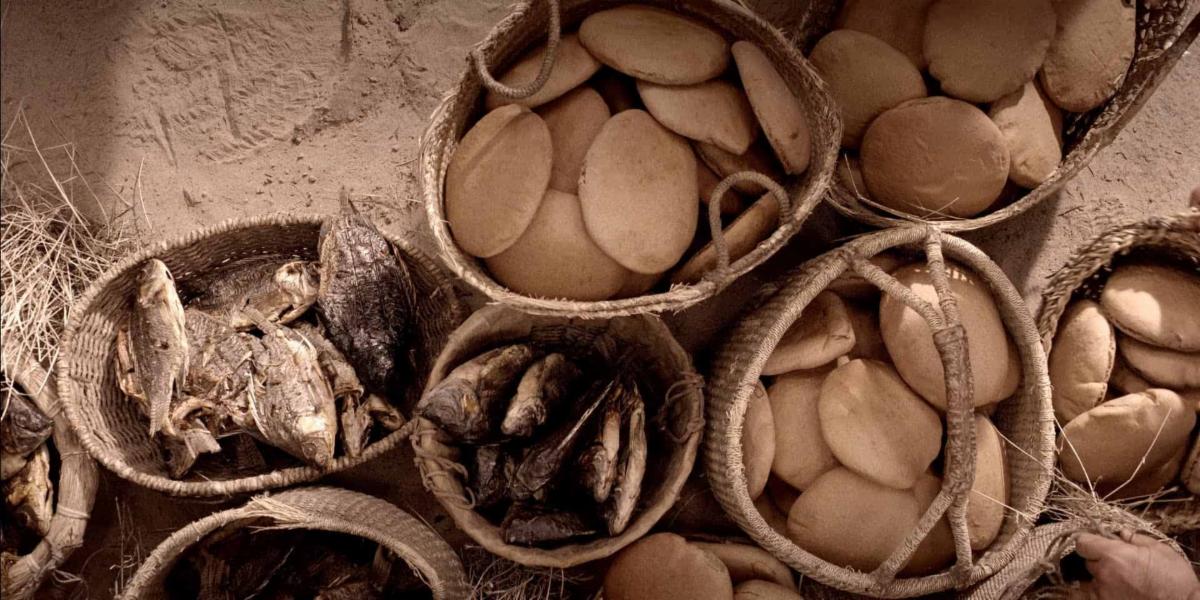
The story of the feeding of the multitude by Jesus was unquestionably a highly relevant one in the oral tradition before the gospels were written. So much so that it appears in the four gospels, and Mark also includes an additional story of the feeding of the 4,000.
In the readings for this coming Sunday we find the feeding of the 5,000 according to Mark’s gospel.
Biblical scholars and interpreters have written a lot about this story and the parallel accounts in the rest of the gospels, and three main trends can be found in the way they interpret the event.
One trend is to simply treat the event as it is recounted by the evangelists, and acknowledge that for them this event was seen as one of the great signs of the coming Kingdom of Heaven made by Jesus while He was on earth.
Another trend has been to rationalize the event, making assumptions that are not in the text. Some interpreters have said the people were moved by Jesus’ words to share what they had brought with those who did not have anything, and in this way everyone had more than enough.
The third main trend is an allegorical interpretation of the event in which the physical feeding of the multitude is seen as the spiritual feeding with the bread of life.
Instead of affirming of refuting a particular interpretation, it may be more fruitful to focus on some of the deep messages that this story conveys, and which are often overlooked by focusing only on the veracity of the “multiplication”.
When reading this text, we notice that the encounter with the multitude was not planned. What Jesus had planned for his disciples and Himself was to find a resting place, a well-deserved resting time after a lot of fruitful life-giving activity. Even so, Jesus’ reaction when meeting the multitude is not one of disappointment, as could be expected. Mark tells us “He had compassion for them, because they were like sheep without a shepherd, and He began to teach them many things.”
Mark does not explicitly tell us how the disciples felt about his unexpected encounter, but we can somehow perceive that they were not so happy. When it got late, they suggested to Jesus that He send them away to buy their own food in the neighboring villages.
That was not likely to happen. Who would be selling food at that hour anyway? It is clear that the disciples’ purpose was to get rid of the problem (out of sight, out of mind). But Jesus had other plans. He instructed them to take care of the situation. “You give them something to eat.”, He said.
At this, the disciples reacted with a remark whose purpose was to ridicule Jesus’ proposal, making it look like an impossible task. They said to Him, “Are we to go and buy two hundred denarii worth of bread, and give it to them to eat?”
It is unlikely that Jesus missed the sarcasm in their words, but He did not reply with harsh words. He simply said to them calmly, “How many loaves have you? Go and see.”
These are the words that made the disciples start to find possible ways of dealing with the situation from within, instead of trying to make it go outside of their concern.
When facing a situation that affects our fellow human beings, it is a natural tendency to try to make it go away, to get rid of it, to pass it on to others. But this is not what our Lord and Savior is asking us to do.
The first thing He is asking us is to take a look at our own resources, at what we already have, no matter how little we may think it is. Then He is asking us to trust that if we put these resources into His loving hands, He will find the way to make them work and be an abundant blessing for those who are in need.
Jesus has given us proof that when we put our time, our talents, or our material wealth trustfully in His loving and caring hands, He can always multiply what we bring, making it work in such a powerful way that the blessings may reach thousands, and even more.
Small personal contributions have always been the starting point of great charitable projects throughout the history of the Church and of humankind. Even if we have no material wealth to offer, our time translated into work, and our unique talents put at the service of a good cause, can work wonders in bringing welfare and joy to the needy.
Next time we are faced with situations of people in great need, before we start planning how to dismiss them or pass them on to others because we do not have the means to help, let us ponder on Jesus’ question for a moment, “How many loaves have you? Go and see.” More often than not, we will find that in deep prayer and trust, small beginnings can go a long way in bringing about abundant blessings for all.
Fr. Carlos Expósito, Rector
|
RETURN TO TOP
Marked with the Seal of the Holy Spirit
This Sunday and Beyond - July 11, 2021
Get it in PDF form with calendar

In the first chapter of his letter to the Ephesians the Apostle Paul exalts God for His abundant grace and love towards those who have been redeemed and adopted as His children through Jesus’ blood.
This letter is addressed to the saints in Ephesus who are faithful in Christ Jesus. Throughout verses 1 to 14, Paul expresses his thankfulness for the glorious destiny of all those who, like the faithful Ephesians, have believed and followed in Jesus’ salvific Way of Love and are consequently joint heirs with Him of God’s reign of love and peace, for the praise of God’s glory.
Paul speaks of a mark that distinguishes those who are destined for this communion in which God is all in all--the seal of the promised Holy Spirit.
In our baptismal liturgy we learn that we are sealed by the Holy Spirit and marked as Christ’s own for ever.
The seal we receive is given through God’s grace, and not earned by our righteousness. As we acknowledge our faults in our way of thinking and acting, and make honest vows to live a new life guided by Christ’s Way, we are granted the grace of the promise of God’s Spirit as our guide and counselor, as our comforter and defender, and constant reminder of God’s truth in the way that Jesus Christ has shown us.
This is the Spirit that enables us, in spite of our weaknesses, to keep up the redemptive work started by our Lord Jesus so many centuries ago. It redeems us and at the same time uses us to redeem others, by inspiring our words and our actions, by keeping us in the way of love and truth in the middle of the most adverse circumstances, and by showing Christ’s salvific power through wondrous acts of healing and reconciliation.
In all this, if it is the Holy Spirit that guides and enables us, there can be no personal boasting for any humble sign that as part of God’s Holy Assembly—the Church—we can make. All the recognition and glory belong solely to the Spirit that does the work through us.
If we are ever in doubt about whether a message or action has been inspired by God’s authentic Spirit, the Spirit of Truth, we must first make sure that no personal boast and no personal gain is being made on the Spirit’s behalf. Then we must ask whom it serves. Does it serve Christ’s Way of Love? Is it faithful to Christ’s true message in Holy Scripture? If these questions are answered in the affirmative, we have authentic inspiration by the Holy Spirit. Otherwise, it may be from any other spirit but God’s.
Jesus’ first disciples were sent out by Him two by two to proclaim God’s salvific plan, to cast out unclean spirits, and to restore abundant life. The Holy Spirit was with them and enabled them to do all these life-giving deeds. But even so, the recipients of these healing acts had to be open to the Spirit’s grace for this to happen. No one can be restored against their own will.
As it happened then, it continues to happen nowadays. We must not give up in the proclamation—through words and deeds--of God’s salvific plan made possible through Christ’s sacrifice and the wondrous power of God’s Holy Spirit. But we should not get stuck with those who refuse to hear. If they are not ready yet, they may come a time when they hear and turn to God. We should simply move on, and speak to those who are willing to hear and receive God’s gracious salvation. The Holy Spirit needs us to do the work, and there is no time to waste.
Fr. Carlos Expósito, Rector
|
RETURN TO TOP
Sharing in Generosity
This Sunday and Beyond - July 4, 2021
Get it in PDF form with calendar
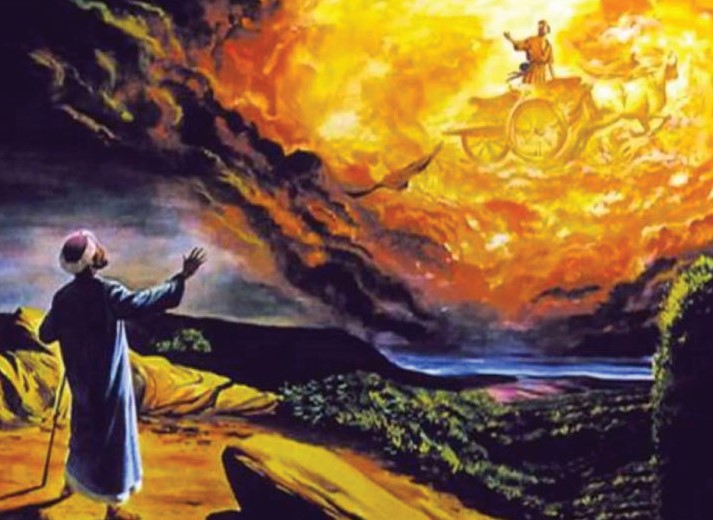
We live in a world that despises both physical and mental weakness, and calls those who do not excel in physical dexterity and business enterprises “losers”. It is a highly competitive world, where the success of one usually means that someone else is left behind or discarded.
Modern education has unfortunately emphasized the development of this sense of competitiveness, of making the individual feel that to succeed and be “happy” in life one must set oneself up against the rest.
Nothing is farther from real Christian values than this. The true sense of Christian joy and aspirations is based on God’s acceptance of each and every one of His beloved creatures, in spite of their achievements or limitations. Our Creator does not need us to show any kind of earthly success to love us. We are unconditionally loved because we are His offspring and loving one does not mean that someone else is loved less.
What distinguishes love from earthly expendable goods like money is its special property to grow and multiply the more it is shared. The feedings of the 4,000 and 5,000 in the Gospels are a great example of this. The more that is given, the more that is even left over for further use.
What this shows us is that all that God expects from us is our love. And the love for our Creator necessarily includes the love for those who are His children, and consequently our brothers and sisters.
In our love for others we must strive to imitate our Heavenly Father. It is not an easy task because by nature we humans tend to be self-centered in our affections, and also to demand conditions for our love. We usually make mental models of the persons whom we think “deserve” our love. If they do not fulfill our model, we discard them and label them as “unlovable” persons.
Only the power of God’s Holy Spirit can make us change our self-centered way of loving towards a way that resembles Jesus’ radical Way of Love. In Jesus’ Way there is no place for boasting of physical or mental powers. If we are given certain gifts by the Holy Spirit, it is only for the sake of sharing it unconditionally with others. And this power is only shown in the midst of our human weakness, so that we cannot boast of anything.
The prophet Ezekiel was given the power to prophesize in a time when God’s people were rebellious and stubborn. God knew that the prophet would face scorn, disbelief, and even hostility. But God enabled the prophet through His Holy Spirit to face all these ordeals. He did not make him superhuman. He made him more human, more sensitive to the people’s great suffering, and also more understanding of their weaknesses and blunders. This enabled him to prophesize in the name of the true loving God.
The Apostle Paul had the great privilege of receiving a transcendental mystical revelation. He briefly comments about it in his second letter to the Corinthians, but does not boast of it. He understands it was only by God’s grace that it was granted to him. And he is also aware of his weakness, even in the flesh. He was probably suffering from some disease, and although he had prayed to God that he would be healed from it, God had made him understand that in his human weakness power was made perfect in him.
We all have unique gifts from God, and weaknesses too. No matter how strong we make ourselves physically through training, or how successful our career may be, the only thing that matters to God is how we use the unconditional love He has given us to make the life of others better, and how we grow in our mutual acceptance and love, regardless of our preferences or models about who may “deserve” our love.
There is no use in pretending to be superhuman. Jesus was not superhuman. He was truly human while He was on this earth, and for this reason the people from His hometown discarded His Messiahship. They expected a spectacular Messiah, not one whose family they knew so well. This blindness deprived most of them from receiving His life-giving grace.
Let us not be blinded by futile aspirations to be “strong” or superhuman. It is only in our natural human weakness that the Holy Spirit’s power can work miracles in us and enhance our acceptance of God’s unconditional love so that we learn to accept others in their weakness and expand the power of love towards the whole of humankind.
Fr. Carlos Expósito, Rector
|
RETURN TO TOP
Sharing in Generosity
This Sunday and Beyond - June 27, 2021
Get it in PDF form with calendar

Both the Old Testament reading from the Book of Deuteronomy and the second letter of Paul to the Corinthians, for this Sunday, tell us about the gift of sharing in generosity.
In the first reading Moses, speaking on God’s behalf, reminds the people that there will always be some in need on the earth, so they must lend and give generously, not expecting anything in return or figuring out when the year of forgiveness is coming so as to withhold a loan, lest one not receive the pay.
The motive for lending or giving should not be the expectation of the payback, but generosity, without any grudge. In the Old Testament writings, the Law is given as a command from God, and there is always a punishment to be expected for not fulfilling it, and a reward for being faithful to it.
As Paul himself states in his writings, the Law was needed when God’s people were like children needing an overseer to take care of them, but as mature people of God in Christ’s New Covenant, we no longer need to be guided by commandments that promise us chastisement or rewards, but by the law of generosity, which is the law of pure love.
In his second letter to the Corinthians, Paul tells his readers about the abundant sharing in generosity that has been shown by the churches in Macedonia, and asks them to follow this example in giving to those in need from other churches as part of their ministry. In his exhortation, Paul uses the example of Jesus Christ Himself, who being the richest in gifts from God, became poor—gave Himself up to death on the cross—for our sakes.
It is clear from the example that Paul’s understanding of riches is not limited to material wealth, but to all the gifts with which we human beings have been endowed by God. But he points out that there should be a just balance between those who have less and those who have more, so that we are all called to give out of our abundance with generosity to those who possess less, including our material wealth. In the Gospel reading for this Sunday, we read the passage in which Jesus, when asked by one of the leaders of the synagogue to heal his twelve-year-old daughter, does not hesitate to share the healing gifts that God provided Him with, even to the point of using them to bring back a dead person to life, when all those who surrounded Him laughed at Him in disbelief. Was Jesus expecting anything in return? No, not even recognition. He strictly ordered the family not to say anything about what had happened.
This is the real way of generosity. Generosity is not measured in the amount of what is given, but in the loving way that what is given is shared with others. When moved to give to others, let us not think about what we may receive in return, but about the good that others are going to receive thanks to our generosity. That alone should make us more than happy. No matter how little we think we have to share, in terms of treasure, time or talent, it may mean the world to the ones who receive it.
There can be no greater punishment than depriving ourselves of the wonderful joy of sharing in love, and no greater reward that partaking of the tremendous life-giving joy of sharing our gifts in total generosity, following the example of our Lord and friend, Jesus Christ.
Fr. Carlos Expósito, Rector
|
RETURN TO TOP
The New Reconciled Creation
This Sunday and Beyond - June 20, 2021
Get it in PDF form with calendar

In Chapter 5 of the Second Letter to the Corinthians, the Apostle Paul urges his readers to embrace the reconciliatory ministry that Christ has entrusted us with, as the core mission of the church.
In his appeal, Paul makes some statements that may seem too radical or daring for his contemporary readers and even for us now, but they contain deep truths we must consider and reflect on.
Paul boldly states that Christ died for all, and therefore, all have died. This may sound mystifying, but it can be interpreted that he is referring to Christ’s sacrifice on the cross on behalf of the world, and how that sacrifice naturally leads everyone to put to death the old self and let the reconciled new creature be born in their lives.
He insists with his readers that they need to shift their point of view from the human to the divine, if they are to grasp what Christ’s message of reconciliation means for the life of the new communities shaped after His Way of Love.
To be reconciled essentially means to be aligned with God’s will for us in the world. It does not mean that we all think or act alike. God created a wonderfully diverse world and saw that it was good. Therefore, the idea that He wants a uniform world made up of people who think, and act alike is out of the question. That may be some tyrant’s ideal in this world, but certainly not God’s or Christ’s ideal of a reconciled new creation.
Reconciliation is firmly based on the power of love. And love implies forgiveness. In our relationships as fragile human beings, it is inevitable that we trespass against one another at times. From the strictly human point of view, we aspire for others to agree with us, to conform to our desires or what we conceive as “right”, or to admit that we are right, and they are wrong. But divine reconciliation cannot be based on those premises.
Divine reconciliation puts love in the first place. Love means caring for the other, doing what is good for the other, even if that implies sacrifice — even if that other is one who has trespassed against us.
Our Lord Jesus has given us the greatest example of the true meaning of reconciliation. He lovingly gave Himself for the ones who trespassed against the Creator, so that we may all have life, and have it abundantly.
By working as Christ’s reconciling agents in this world, by putting our petty self-interests and claims for retaliation aside, we can greatly contribute to the coming of a fully reconciled new world, where harmony in diversity prevails, and all peoples can live together in peace, procuring one another’s greatest good, and living a love-filled life in true joy.
Fr. Carlos Expósito, Rector
|
RETURN TO TOP
Seed Planting
This Sunday and Beyond - June 13, 2021
Get it in PDF form with calendar

A seed is a most wonderful miracle and yet, because it is such an ordinary one, we take it for granted and miss its awesomeness.
Think of it. It is a small capsule containing all that is needed for a plant to grow and develop to its fullness. It has the nutrients that keep the tiny plantlet alive until it is planted, and then, the capsule decomposes, and the small sprout emerges out of the soil, ready to take on the needed nutrients and water from it, and it grows, and grows…
It may seem like a smooth process, but breaking up and decomposing is not agreeable for the seed. And the sprout has to push up its way through the soil to emerge. And then the new-born plant has to struggle to find the proper nutrients and water to survive and grow. It is so fragile at the beginning.
Some seeds are larger than others, but the real size of the plant that will come from it cannot be guessed by the size of the seed. The mustard seed that Jesus refers to in His parable is a good example. It is tiny indeed, but the mustard shrub is big, and birds can make nests on its branches.
And it all goes unnoticed. No one would waste their time trying to follow the process by which the seed becomes a mature plant. It may take years. But no human intervention other than the planting, the watering, and the occasional weeding and fertilizing is needed.
People plant seeds and they expect to reap their fruits. It is all done in faith. If someone tried to speed up the natural process by breaking up the seed, for instance, it would probably kill the plantlet, and everything would be lost. No fruits would be reaped.
Jesus uses the example of the seed to give us an image of God’s kingdom. In God’s reign what is to be may not always be tangible from the beginning, but is in constant development and growth, and will inevitably come to fruition. No violence can be done out of impatience to get the final results. We need to wait in faith, in total confidence that the greatest good is just there, in embryonic form, and that God will take it to its fullness in due time.
The world as it is now may not look like a promising state, but the seeds of love have been planted and they will inevitably yield their abundant fruit. Jesus came to plant these seeds abundantly in us, His followers. But just as the natural sprouting process requires sacrifice and hard work, so must our faith be nourished and kept alive against the hardships that we find in this world of ours.
The water we need is granted by the Holy Spirit, and God’s Word itself is our nutrient. The weeding and fertilizing are all we are asked to contribute to the process. Weeding is done when we manage to cast divisiveness out of our lives and the lives of others. Fertilization is carried out by spreading the Good News, through our daily words and deeds, so as to help others grow in their faith.
This faith is the strength that will enable us to have relentless confidence and push upward, until God’s love expands in us and makes us yield abundant fruits that can be shared by all.
Fr. Carlos Expósito, Rector
|
RETURN TO TOP
Divine Family Ties
This Sunday and Beyond - June 6, 2021
Get it in PDF form with calendar
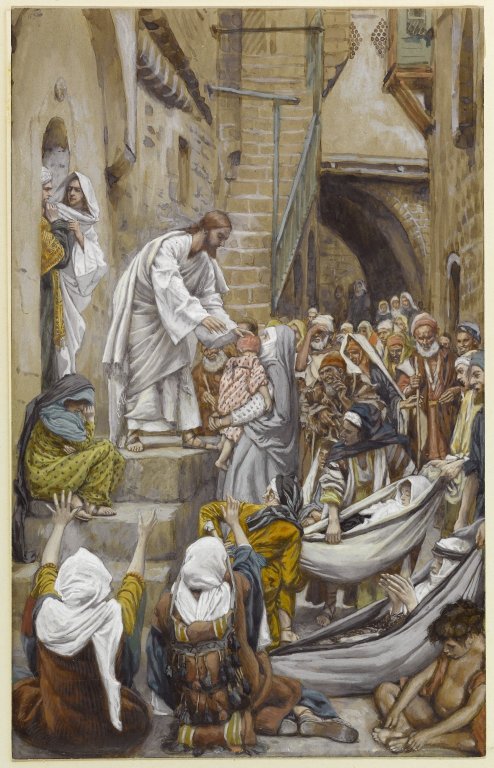
This week’s readings are about our relationship with the divine and with one another in this divine fellowship.
The reading from Genesis brings us the sad story of our estrangement from God, our hiding away from His presence, our useless attempts to stand by ourselves, apart from our Creator, and without His loving life-giving breath, His closeness, His friendship. Even so, the Heavenly Father makes us hear His sound in the breeze, and calls us by name to His presence, and lovingly covers our shame with His clothes. Furthermore, He opens up the prospect of our redemption, foretelling that a son of woman will crush the head of the one who brings about the split—the evil one.
The one who puts an end to our estrangement from the divine family is the Son of Man, the Messiah, Jesus Christ our Lord. By giving Himself lovingly in sacrifice He made the evil one believe that He was trapped in the clasps of death. But His overwhelming act of unconditional love destroyed the power of the evil one and redeemed us forever. The loving Father raised Him from the dead, and as Paul says in his second letter to the Corinthians, “we know that the one who raised the Lord Jesus will raise us also with Jesus, and will bring us with you into His presence.”
In the Gospel reading according to Mark, there is a story about how some people vilified Jesus’ life-giving deeds of love. These acts powerfully testified of the presence of the Holy Spirit in everything Jesus did. However, some people, including the scribes and members of His own biological family were calling Him crazy, or that He was possessed by unclean spirits. Jesus had been vilified before, but calling the Holy Spirit unclean was more that He could put up with. That is probably why He clearly states that the blasphemy against the Holy Spirit will not be forgiven. His divine filiation—which includes that of His faithful followers—could not be spat upon.
Then there is a point in the story in which His biological family calls Jesus to come outside of the crowd. They were probably thinking that Jesus was calling too much attention to the authorities, and this would put Him in mortal danger. They were more than right. But Jesus was well aware of His mission and His divine family ties. His words should not be interpreted as a refusal of His biological family, but as a sign of a much broader perspective--one that clearly includes all His prospective followers into the divine family of which we have always been a part.
Our voluntary estrangement from the divine family can only bring us pain and divisiveness among one another, even among the members of human families. In the Genesis story Adam blamed Eve, and Eve blamed the serpent. There was not even a responsible recognition of the decision each had made. They not only estranged themselves from the Heavenly Father, but from each other.
So it continues to happen in our time. Only through our coming back to the divine filiation, through the mediation of our brother and Lord Jesus, in the power of the Holy Spirit, can our broken relationships and lives be put back together again. Then, instead of shame and fear, our hearts will be filled with joy and love, when our Heavenly Father calls our names in the evening breeze, and invites us all to stroll together with Him through His unbounded realms.
Fr. Carlos Expósito, Rector
|
RETURN TO TOP
Love Divine
This Sunday and Beyond - May 30, 2021
Get it in PDF form with calendar
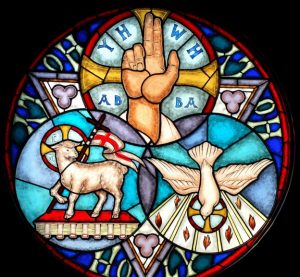
We gather in the name of one God: Father, Son, and Holy spirit. One God, not three. One God in unity and substance, one God who creates and redeems and sustains. the three persons do not destroy the unity. instead, they tell a story of love, a unity of creative and loving exchange.
There is a font of being, a hidden ground of love from which all things come. Yet, even before there was any- thing, the font of being, whom we are bold to call Father, pours love out to love’s object, the eternal son of the Father. the son, being and receiving the love of the Father, returns that love in an endless exchange of love called the Holy spirit. the scriptures, the Creeds, and the whole Christian tradition tell us that God is this love from before time and forever. When God created, he created out of this same eternal Love. “Holy and gracious Father: in your infinite love you made us for yourself” (BCP, p. 362).
We may, with the scriptures, imagine the trinity while never losing sight of the unity. the Father, whom the Christian tradition in the West also and often calls Parens (parent) and Fons (font), may be thought of as the transcendent source of all being. “I saw the Lord,” says the prophet Isaiah, “sitting on a throne, high and lofty, and the hem of his robe filled the temple. seraphs were in attendance above him… and one called to another said; ‘Holy holy, holy is the Lord of hosts; the whole earth is full of his glory” (Isaiah 6:1-8). God is in the high vault of heaven, shedding glory into the world and beholding the depths (Canticle 13). “Who is like the Lord our God who is seated on high?” (Psalm 113:5).
What a joy it is for the Church to exclaim, “Holy God, Holy and Mighty, Holy immortal One” (Trisagion). in such praise, we ascend with our hearts higher and higher, above all that we can know or imagine until we seem almost to touch “that than which nothing greater can be conceived” (St. Anselm). But, in truth, we cannot ascend to such heights on our own; we cannot go unaided to where God is, we cannot touch the hem of the Father’s robe but for the unimaginable good news that God has come to us in a Son.
God is with us. “the Word became flesh and lived among us” (John 1:14). Jesus is “the splendor of the temple,” a walking “throne of majesty,” the presence “seated between the Cherubim” (Canticle 13). “All that the Father has is mine. For this reason I said that he will take what is mine and declare it to you” (John 16:15). “the Father and I are one” (John 10:30). Jesus is also the Son of Man, our brother and companion, our teacher and healer, the archetypal human being. still, he is transfiguring glory, light from light, true God from true God. Jesus is the way to the Father. the only way to know the Father and the Son is to be “born from above,” “born of water and spirit” (John 3:3, 5). After his ascension, Jesus sent the Holy Spirit to rest upon us, dwell within us, and lead us into all truth. in the spirit, we know the Son, and through the Son, we come to the Father. this mystical and true knowing is pure and everlasting love.
The Lord sits enthroned. the Lord walks among us. the Lord is water and spirit welling up in us.
Note: Fr. Carlos is on vacation this week. The source of this week’s Reflection is from "The Living Church" – Commentary on Trinity Sunday’s Readings.
|
RETURN TO TOP
United in Diversity
This Sunday and Beyond - May 23, 2021
Get it in PDF form with calendar
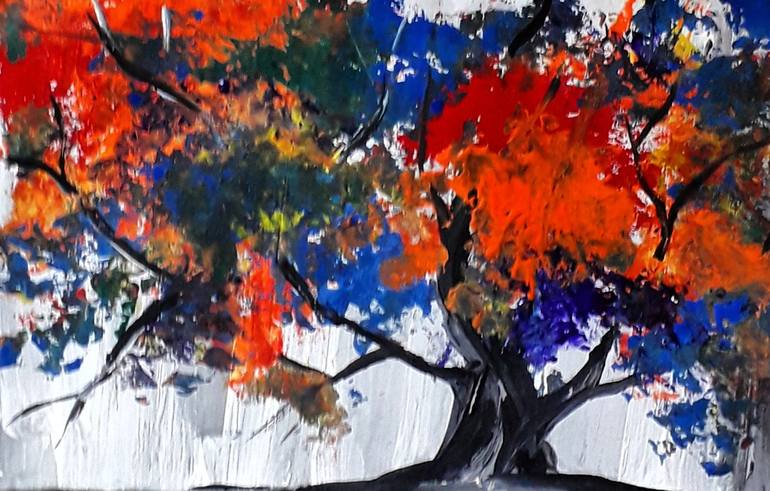
The topic of diversity has been at the forefront in the media for decades now. The social movements promoting the equal rights of all human beings despite their different gender, ethnicity, national origin, social status, ideology, beliefs, and even sexual orientation, have shaken, and are still shaking the nation and the world, and rightly so, because any kind of discrimination that makes people suffer must be opposed and done away with.
As Christians, we advocate for the elimination of these unjust divisions and the reason why we do it is ingrained in the very essence of our faith. We passionately believe that we are all sons and daughters of a loving Father, and therefore all brothers and sisters. We also believe that it is one and the same Spirit that sustains us all, as Paul states in his first letter to the Corinthians. The particular gifts that the Spirit gives to each person are the blessings that keep the community functioning properly, just as the different members in the body.
The notion of unity in diversity is as old as Paul’s writings, and even older, because the story of Creation has it that we are all derived from one couple, created in God’s image and likeness.
Lately this notion has been accepted and propounded by science, in the theory of the beginning of all that exists. The theory states it all started with a single indistinct particle, and this diverse universe has gradually evolved from it.
We should all be happy that there is such a clear understanding of this notion at present. But how does that reflect in our human relationships with others?
Sadly, at this very moment, there is a horrendous war going on in the Middle East, the same place where Jesus walked and proclaimed his all-inclusive message of unconditional love. More than 20 centuries later, people still kill one another in the name of territorial rights and even religious differences.
The panorama may look somewhat better where there are no actual wars going on, but the sad fact is that hatred due to intolerance and bigotry still abound in most parts of the world.
We may grasp the notion of unity in diversity with our minds, and even agree to its truth and logic, but what is needed is a radical change of heart in each person, in each community: a real embrace of the Way of Love that God’s Son proclaimed while on earth, with His words and deeds, and that we, His followers, have been entrusted to carry on.
The Spirit that filled Jesus’ followers on Pentecost and broke the national and linguistic barriers that separated those present, so that the message of salvation could be preached to all, is the same Spirit that gave rise to the Christian church and keeps it alive even to this day.
We need to ask the Holy Spirit fervently, continually, to fill our lives with the unity that blesses all diversity and makes us be united in one and the same purpose: to make His Word soak the earth like loving rain so that the abundant fruits of love can be reaped.
Fr. Carlos Expósito, Rector
|
RETURN TO TOP
The Fullness of Him Who Fills All in All
This Sunday and Beyond - May 16, 2021
Get it in PDF form with calendar
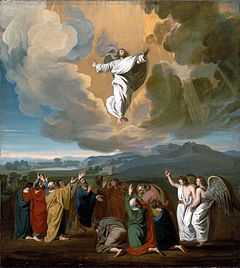
In this world of ours up is always better than down. We are constantly striving to be at the top of lists or charts, and children love to jump as high as they can, so they defy gravity, at least for a moment. We want to live ascended lives, break free from what holds us down, so to speak.
There is nothing wrong with that. Something within us knows we are more than earthbound creatures. And that is good. Unfortunately, we have distorted what ascension and an ascended life means. We have forgotten that Christ’s ascension sets humanity next to God and we trust in our attempts at self-ascension instead.
This distorts our understanding of God and makes us believe that heaven and holiness are up there somewhere while we are down here. So, we spend our lives comparing, competing, and judging others. We fill our lives with busyness hoping to climb to new heights. This fragments our world and our lives. It separates the creature from the Creator and destroys relationships and intimacy. Our attempts to self-ascension ultimately become the gravity that deny us the ascended life we are seeking.
Jesus’ ascension is the only authentic and life-giving ascension. It is the corrective and antidote to the fragmentation of our attempted self-ascension. Through Him we can also live true ascended lives.
His ascension is not about His absence but about His presence. It is not about His leaving but about “the fullness of Him who fills all in all”, according to the writer of 1 John.
Jesus’ ascension completes the resurrection. His resurrection is victory over death. However, His ascension lifts humanity up to heaven. It seats human flesh at the right hand of God the Father. Now we partake of God’s glory and divinity.
When the men in white asked, “why do you stand looking up to heaven?” it was as if they were saying, “do not misunderstand and disfigure the moment. Do not deny yourselves the gift that is being given you.”
Ascension is not so much about reaching and grasping, but about letting go. Asking “How do we ascend?” is useless. That has already been accomplished for us. The question should rather be, “What pulls us down?”
Think about the ballast in your own lives. Could it be fear, anger, or resentment? Or perhaps the need to be in control? For some self-righteousness, jealousy, or pride is their gravity. For others it may be the chains of perfectionism, or indifference and apathy.
This gravity that keeps us down is not creation or the circumstances in our lives. It is within us. Our participation in Jesus’ ascension begins not by looking up but by looking within.
Based on ideas from a sermon by Michael K. Marsh, Episcopal Priest.
Fr. Carlos Expósito, Rector
|
RETURN TO TOP
Loving Is Knowing
This Sunday and Beyond - May 9, 2021
Get it in PDF form with calendar
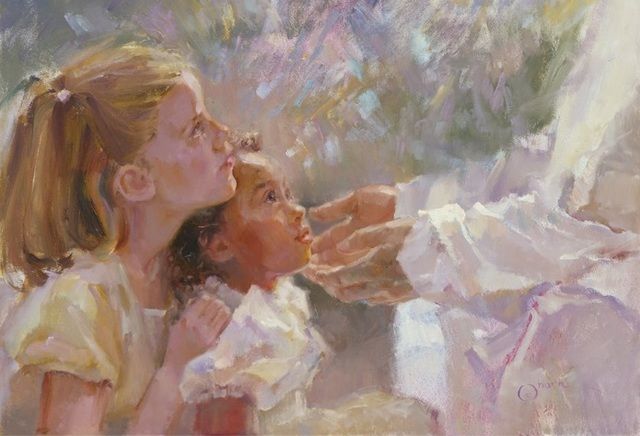
The overarching theme of the Gospel according to St. John is undoubtedly love. And so is that of the First Letter ascribed to St. John.
Both the Epistle and Gospel readings for this 6th Sunday of Easter hinge on God’s love as the starting point for the salvific plan that is made possible through the atoning sacrifice of Jesus Christ our Lord, as the supreme and ultimate expression of this love towards us.
The New Testament writers--as direct heirs of Jewish thought--did not attempt to describe God in philosophical terms. For them knowing God was not an intellectual exercise. They understood how absurd and pretentious it would be for the finite to attempt to grasp the infinite.
It is notable that the verb they used in Hebrew to describe the most intimate of relationships between two persons was the same one used for knowing. It is thus that even in the New Testament—which was originally written in Greek—we still have the verb to know in passages that refer to sexual intercourse, as when Mary asks Gabriel after he announces her that she would conceive a child, “How shall this be since I know not a man?”
For John the Evangelist the only possible way of knowing God—if that is even possible—is loving Him. The only way he ever defines God is by saying that He is love. He clearly understands that for us human beings there is no possibility of grasping God with our minds—God is well beyond our limited conceptions—and it would be even useless to try to do so. What really matter is how we relate with our Creator, with one another, and with the rest of creation.
But the Evangelist does not state that God is defined by our love of Him. He clearly states that God is love because He loves us first, and the undeniable supreme proof of this love is Jesus Christ’s sacrificial atonement for us. So, the love John refers to is not a beautiful abstract concept for philosophers to ponder on. It manifests itself in very concrete acts throughout history. Creation itself is an act of love. The powerful salvific acts of God towards His chosen people are proof of this love. But the ultimate proof is the Jesus event.
Jesus Himself refers to this love coming first from the Father and reflected in His unconditional sacrificial love for His followers. He understands how it is only by abiding in this love that we can attain complete joy in our lives. And He commands us to put this love into practice in our mutual relationships, treating others as friends, just as He has treated His followers as His friends.
Knowing someone, whether it is a close relative or our neighbor, is not about collecting information about their identity and lives. As much as you read information about someone, you do not really get to know that person until you enter into a loving relationship with them. And this is not only true of romantic relationships, because the love we are referring to comprises all acts of selfless kindness that can be done for others.
Therefore, if we want to get to know our God, the sure way is by striving to do selfless acts of loving kindness for those we come in contact with throughout our lives. As John clearly puts it in his First Letter: “Those who love God must love their brothers and sisters also.”
Fr. Carlos Expósito, Rector
|
RETURN TO TOP
The Way, the Truth, and the Life
This Sunday and Beyond - May 2, 2021
Get it in PDF form with calendar
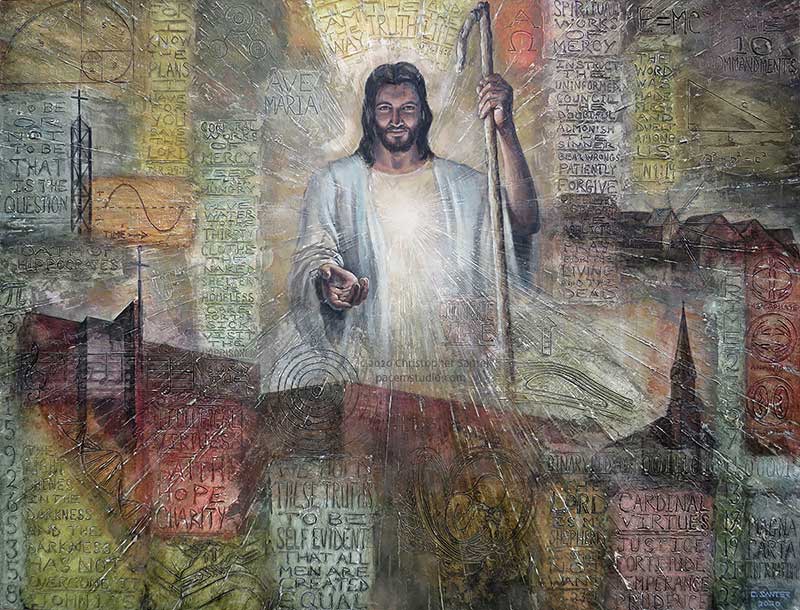
Although the phrase “I am the way, the truth, and the life” appears only in the section of John’s Gospel that is used in Year A (John 14: 6), the Collect for this Fifth Sunday of Easter always invites us to know Jesus Christ “to be the way, the truth, and the life, that we may steadfastly follow His steps in the way that lead to eternal life.”
In 1 John 3: 14-24--the Epistle that is read this Sunday, the writer states that we know we have passed from death to life because we love one another. And he adds, “whoever does not love abides in death.” It is clear that what the writer is referring to here is not life and death in their biological manifestations, but life and death as the Fourth Gospel conceives them.
John’s Gospel refers to life as the abundant life, the eternal life that Jesus has because He abides in the Creator and does His will. And Jesus wants us to share in this life by following His Way of Love, which is the only truth that the Holy Spirit confirms as the way to attain eternal life.
Eternal life has often been interpreted as to mean a life that extends indefinitely in the time continuum that our limited minds conceive as the only way of existing. But when we read the Fourth Gospel, we notice how the writer often uses the term abundant life to refer to this new quality of life that Jesus wants us to share with Him. This abundance is not expressed in terms of amount of material possessions, but in the quality of richness of our relationship with the Creator and with one another. In other words, it has to do with our capacity to express love.
Though the writer does not make any philosophical proposition as to what this eternal life could actually mean, it is clear that he equates it to love, and love in a very pragmatic manifestation. In his letter, he asks the following question, “How does God’s love abide in anyone who has the world’s goods and sees a brother or sister in need and yet refuses to help?” There is no place for mellow feelings here. Love is concretely manifested as selfless acts of service to our neighbor.
We may venture to make a proposition here, although it is only a conjecture. Since the Creator’s selfless love gives rise to life, and He lives in timelessness, when we imitate the Creator’s selfless love in our lives, we start to share in His timeless quality as well. Our life then is abundant and eternal. Time can no longer constrain it. Such is the limitless power of love.
The death the Fourth Gospel refers to has to do with severance from the true source of life--the Creator--by our own choice, when we live self-centered lives only and true love has no place in our lives. No matter how biologically alive we may be, a life which is devoid of love is a senseless life, it is the worst kind of death.
Jesus promises His followers the presence of the Advocate, the Spirit of Truth, that will teach us all we need to do to follow His commandments: to abide in His Way of Love. This is the true Way of Life that will snatch us from the power of death and lead us to a full communion with our Lord and with one another in the abundant life of self-giving love.
Fr. Carlos Expósito, Rector
|
RETURN TO TOP
That They May Have Life, and Have It Abundantly
This Sunday and Beyond - April 25, 2021
Get it in PDF form with calendar

The Gospel reading for this Sunday (John 10: 11-16) is the second part of the discourse about the Good Shepherd in chapter 10 of John’s Gospel. But in the middle of the discourse, just before verse 11, which starts the section read in Year B, we have these words by Jesus, “I came that they may have life, and have it abundantly.”
He uses this phrase to define His purpose as the Good Shepherd of the sheep. Indeed, we may say that the whole imagery of the Good Shepherd, the sheep, the hired hand, and the wolf hinges around this phrase. It is all about abundant life.
What is abundant life? When do we feel that our life is full and worth living? Is it when we obtain a lot of material things or other achievements? Some of these things can give us a momentary sense of contentment, but in the long run we will feel lacking again, unless our life is lived with the assurance that we are loved by our Creator and that we have been put on this earth to bear the beams of love for those around us.
Jesus is certainly our Good Shepherd. He is the one who can give us this assurance through his self-sacrifice and boundless love towards us. But we could expand this image.
Who are the people in our lives who have been there for us when we needed them most—the ones who have pointed to us the abundance that was already there, but we could not perceive? Those are also good shepherds in our lives. And there may be times when we have been good shepherd for others as well. We have been tended sheep, and so have others in relation to us.
And then there are those who have failed us. They only show up when the pay is good enough, and when there is no major danger threatening them. They have been detrimental in our lives, making us doubt about the reality of love and goodness. Unfortunately, there have been times when we have failed others as well.
Who or what could be the wolves in our lives? Who or what snatches away our abundance, our assuredness in God’s self-giving love for us and our unconditional love for others? It may be someone who leads us astray, making us follow false leaderships and causes. It may also be our overdue concerns for material gains, our busyness, our self-centeredness.
Jesus gives us all these images for us to ponder on our own lives, on our different roles in this drama, on the people and forces that affect us, and on abundance as the ultimate goal of our life. He is not giving us easy answers or solutions, but He is definitely pointing to Himself as the one who makes this abundant life possible for us and asks us to follow in His footsteps to make it possible for others as well.
As we celebrate the Good Shepherd Sunday, let us never forget that this Good Shepherd came that we may have life, and have it abundantly.
Fr. Carlos Expósito, Rector
|
RETURN TO TOP
Walking in the True Light
This Sunday and Beyond - April 18, 2021
Get it in PDF form with calendar

Eastertide is the season of the Christian calendar that constantly reminds us that we, as Jesus’ followers, have the greatest and most wonderful of certain hopes—a new life lived in communion with our Go., It is a renewed self-giving life that has no end because it transcends space and time constraints, the resurrected life of which Jesus Christ makes us all partakers through His self-giving sacrifice and His victory over the dark powers of sin and death.
In 1 John, chapter 1, the writer declares the truth of what he has not only heard but seen and even touched with his own hands--Jesus as the Word of Life, the Life that was revealed to him and the other disciples in a person-to-person fashion through the mystery of Incarnation, and whose glory they have witnessed through the even greater mystery of Resurrection.
Revealed truth has always been likened to the true Light. Light is what dispels the darkness and enables us to see the way clearly. When someone is honest and truthful in their ways, that person is said to be of the light; conversely, those who live in pretense and lie are said to be of the darkness.
Our loving Heavenly Father is the author of Light, and He Himself is Light, because He is the author of all truth. So is His only-begotten Son Jesus Christ our Lord, and we who would like to live in communion with them, need to walk in the true Light to make that communion possible.
Walking in the Light does not mean that we are all perfect and sinless all of a sudden. That is not a realistic goal. The Church, as Christ’s Body on earth, recognizes itself as imperfect and sinful. We all sin because our human nature, even though it reflects our Creator’s nature as an image, is not without its dark spots. The more we walk in the true Light, the closer we get to reflecting His pure Light in fullness.
The first thing we need to do, then, is recognize our dark spots, be honest about them, and stop living in pretense. As the writer of 1 John states, “If we say that we have no sin, we deceive ourselves, and the truth is not in us. If we confess our sins, He who is faithful and just will forgive our sins and cleanse us from all unrighteousness.”
If we try to show forth light by trying to hide our dark sports, we will only get the opposite result. The Light has to shine from within, from our real selves, and the first step in the process of transformation is the honest recognition of our sinful lives, and the deep and true desire to be cleansed by Christ’s redeeming power. After all, this is the reason why Jesus came to the world, to be the atoning sacrifice for our sins, and through His glorious resurrection He has shown us His power to make us anew in His ineffable Light.
Fr. Carlos Expósito, Rector
|
RETURN TO TOP
Not with the Water Only, but with the Water and the Blood
This Sunday and Beyond - April 11, 2021
Get it in PDF form with calendar
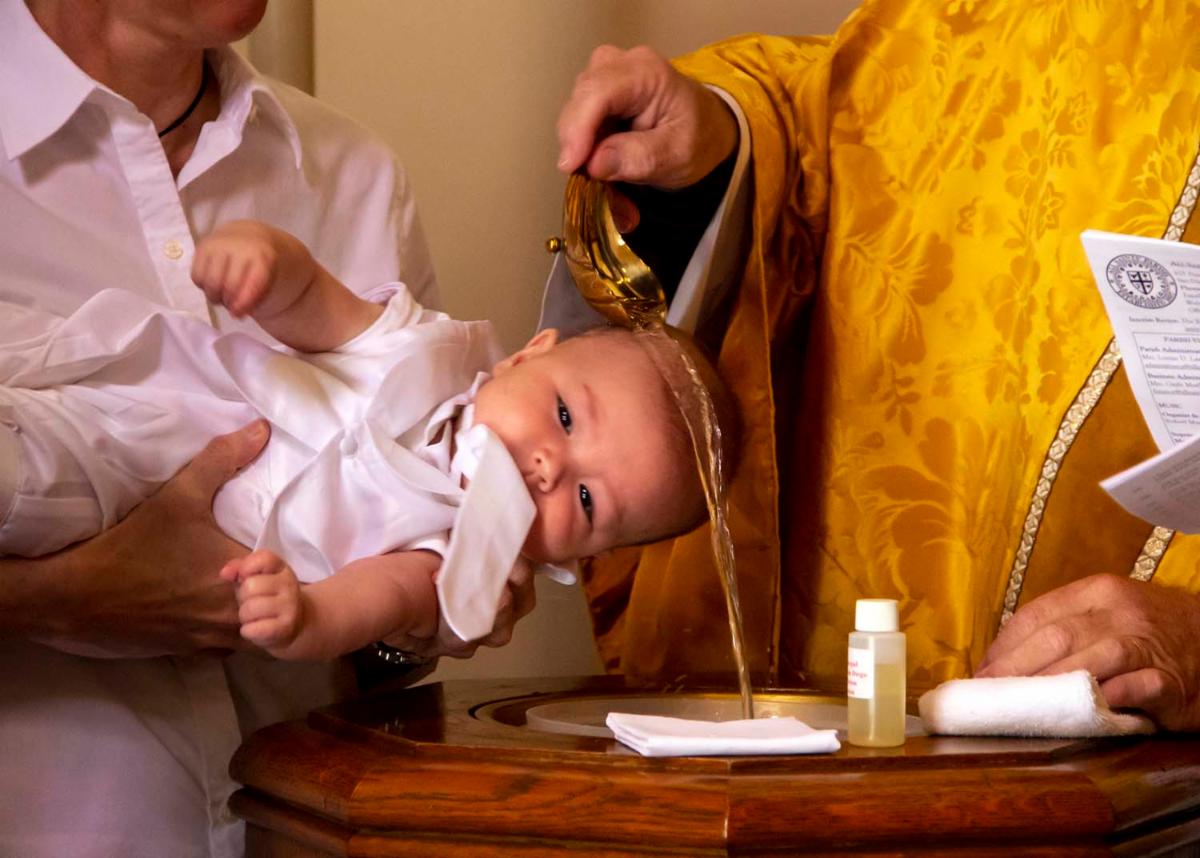
Jesus was a great teacher, probably the greatest of teachers ever. What the Christian faith is based on, however, is not solely Jesus’ great teachings, like the ones in the Sermon of the Mount, and His extraordinary parables, which result in a totally renewed vision of the essential spiritual values that humankind must heed.
It is not even based solely on Jesus’ exemplary ministry on earth, a ministry of healing, reconciliation and feeding, of accepting and including, during which He showed His followers that His radical, all-inclusive Way of Love is the only way to abundant life, the way to God’s life.
What our Christian faith promises us is based mainly on Jesus Christ’s victory over the dark powers of the world, whether visible or invisible, including sin and death. Jesus could not be retained by death in the tomb. If that had been the case, we would have had a great spiritual teacher who did great wonders during his lifetime, but nothing else.
But God raised Him from physical death. The dark unjust powers that plotted His mock trial and condemned Him to crucifixion did not have the last word. God’s love did. He who is God’s life in Himself could not remain dead. As paradoxical as it may sound, He willingly underwent this cruel and unjust death in order to defeat its power, not only for Himself, but for us all.
By raising Him from the dead, God has not only shown that His loving power cannot be mocked or defeated, but that true life is a new kind of life, a resurrected life, a life lived in the abundance of God’s unrestricted love; a life that transcends time and space and embraces each and every one of us everywhere and at every time in history.
In 1 John, the writer, referring to our Lord Jesus Christ, clearly states, “this is the one who came by water and blood” ...” not with the water only but with the water and the blood. And the Spirit is the one that testifies, for the Spirit is the truth.”
It is clear that the writer of this letter understands that Jesus came not only for enlightenment, which he received abundantly from the Holy Spirit, made manifest to Him in the waters of His baptism in the Jordan River, but as the Redeemer of the world, as the one who would free us from the dark powers of evil, sin, and death. And the only way to achieve this was through His self-sacrifice on the cross.
He did not reject the unjust and cruel death, the shedding of His own blood, but accepted it as a living sacrifice to do away, through His glorious resurrection, with the power of sin and death upon us all. And the Holy Spirit, the Spirit of truth, testified this to His followers then, as it testifies it now and in all times.
He has left us the two main sacraments that remind us of this great truth: Baptism in water as our weaving into His Body, the Church, and the Holy Eucharist, as our continual nourishment in His life, and our participation in His loving sacrifice.
May we always remember that our resurrected Lord and Savior came not only to enlighten us, but mainly, and above us, to redeem us through His sacrificial death, and let us be faithful partakers in His loving sacrifice.
Fr. Carlos Expósito, Rector
|
RETURN TO TOP
An Open-ended Story
This Sunday and Beyond - April 4, 2021
Get it in PDF form with calendar
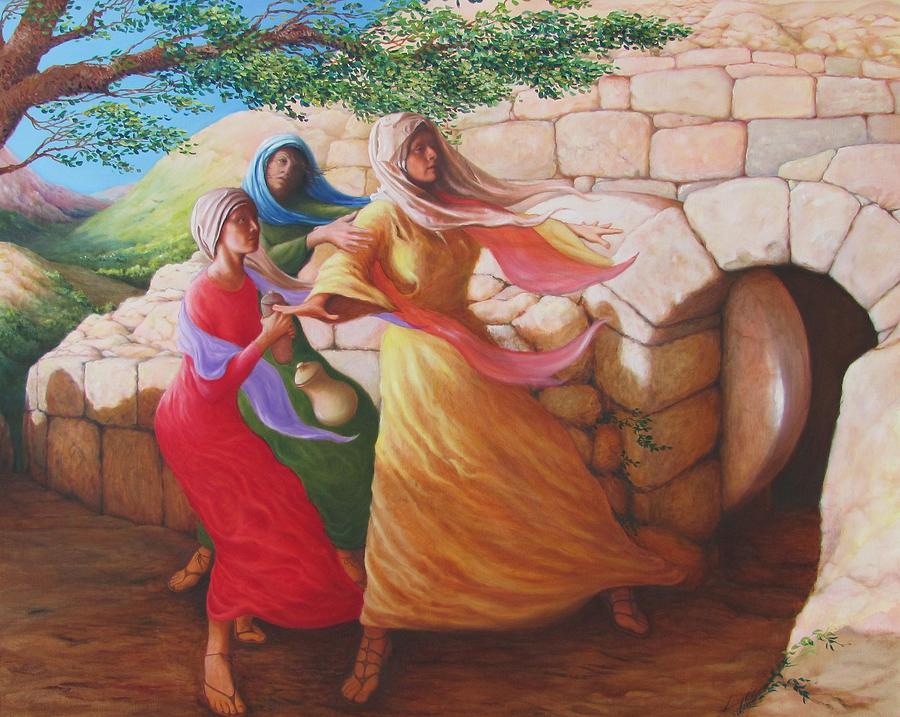
We are in Year B and the story about Jesus’ resurrection this year is according to St. Mark’s Gospel. This Gospel is considered by scholars to be the first one written, and it is evident that both the writers of Matthew’s and Luke’s Gospels took a lot of material from this source. Scholars also agree that the last portion that we find in several manuscripts (Mark 16:9-20) was a later addition to the original because the original ending of the Gospel was somehow lost.
Although it is logical to think that the writer must have written a conclusion to his Gospel and that it got lost somehow, the fact is that what we have in the original manuscript is an open-ended story. Could this have been the writer’s original intention?
The narrative of Jesus’ resurrection in this Gospel is brief, but it contains the essential elements that leave us no doubt that Jesus Christ, the Son of God, was not left in the tomb, but was risen by His Father and our Father. This was clearly announced to three women when they were intending to perform the duties of anointing the body early on the morning of the first day of the week.
Jesus’ body had not been properly prepared for the burial because the Passover was close at hand, so He had to be put in the tomb in haste. Mary Magdalene, Mary the mother of James, and Salome went to the tomb at sunrise on Sunday to perform this sacred duty. On the way, they must have felt heart-broken, and also worried about how they would get into the tomb that had been covered by a heavy stone.
Great must have been their amazement to see the stone removed and no Jesus inside, but a young man sitting on the right side, dressed in a white robe, who announced to them that Jesus had been raised and was going ahead of them to Galilee. They were instructed to pass this extraordinary news to the disciples, but the original manuscript simply ends by stating that they fled from the tomb “for trembling and astonishment had come upon them; and they said nothing to anyone, for they were afraid.”
This is the most human of reactions before the greatest of mysteries: the victory of life over the dark forces of evil and death. It is something that ought to fill us with the greatest joy, and it does; but at the same time, we human beings are reluctant to accept the extraordinary, that which contradicts the expected outcome, no matter how sad it may be.
This ending does not tell us what the women did later, or what the disciples did. It has no post-resurrection stories as the rest of the Gospels. It just leaves the story here. There is a potential for development, for change of attitudes, for renewal, for turning normal fears and disbeliefs into something positive that makes us participants in Jesus’ resurrected life.
The great thing about such an open-ended story is that it then becomes our story, not just the three women’s story. It goes on throughout the centuries, and we never cease to be amazed by the terrific news of Christ being risen, by His total victory over sin and death. Then, gradually, our initial fears start to fade and are replaced by our tremendous joy of knowing and experiencing that because He lives we also live, that He has conquered eternal life for us.
Fr. Carlos Expósito, Rector
|
RETURN TO TOP
Hosannas to the Crucified King
This Sunday and Beyond - March 21, 2021
Get it in PDF form with calendar
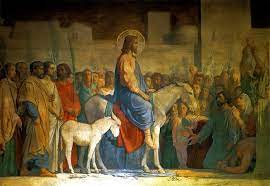
Sunday of the Passion: Palm Sunday marks the beginning of Holy Week—the major week of the Christian Year. The stark contrast between the two parts of this liturgy makes it look somewhat “schizophrenic”, but this has been done on purpose by the liturgists who put this celebration together.
Jesus is acclaimed with Hosannas as the Savior, as the one who is to bring the kingdom of David, on his entry to Jerusalem riding a colt--a symbol of humility and peace; and those who welcome him lay down their cloaks on the road and spread out leafy branches as a sign of acknowledgment of a victor.
These people have witnessed or heard about Jesus’ abundant life-giving signs during His ministry throughout Judea, Galilee, and surrounding areas, and have also heard about His life-giving words, and they hope that Jesus becomes their long-expected Messiah, and probably free them from the Roman yoke and the restraining chains of their society. And this is the way they express their joy and hopeful expectations when Jesus comes to take part in the Passover celebrations in Jerusalem.
Jesus must have foreseen that this would happen, and he made his entry riding on the colt, not because he had a long distance to walk—the distance was short indeed, but because he wanted to give these people the opportunity to acknowledge His Messiahship, but in the way of the suffering servant depicted by the prophet Isaiah, in meekness and self-sacrifice. He knew that coming to Jerusalem would put Him in mortal danger, and a few hours later this would come true for Him.
The second and longest part of the liturgy on this day narrates Jesus’ betrayal, apprehension, unfair and contradictory trial, condemnation, scorn and scourging, crucifixion, and death. So, after the joyous singing of the Hosannas and the waving of the palm fronds that symbolize our welcoming of Christ into our own lives, we listen to and take part in His condemnation and unjust death.
It is not important to determine if the mob that the priests and scribes instigated so they would shout “crucify Him” was made up of most or some of the same people who shouted “Hosannas” before. It is a well-known fact that mobs are easily influenced and can be made to change their minds.
What the liturgy wants to stress, though, is that we are the protagonists of this drama. No matter how reluctant we may be to admit it, although there are times in our lives when we are willing to let Jesus and His radical Way of Love rule over, and we are faithful followers of His self-giving sacrifice, there are also times when we reject Him, leave Him out, and want nothing to do with His unconditional love. During these times, we put the nails back on Him, so to speak.
The good news is that He has not come to condemn but to save. The story does not end with hopelessness and death, but with victory and resurrection, and restoration of broken relationships. The disciples who forsook him were restored, and they later on became the core community that spread the Good News of Salvation to the whole world. As present-day disciples, we may also falter at times, but considering that He has put His faith in us to carry out His salvific mission in our present-day world, let us pray that we do not fail Him, but are also invested with His Holy Spirit to carry it on.
Fr. Carlos Expósito, Rector
|
RETURN TO TOP
Priests in the Order of Melchizedek
This Sunday and Beyond - March 21, 2021
Get it in PDF form with calendar

The Letter to the Hebrews makes a connection between Jesus Christ as our High Priest and this biblical character who is mentioned briefly in the Book of Genesis, Melchizedek, king and priest of the Highest God, whose name means king of righteousness, and as king of Salem—the former name of Jerusalem—he is also recognized as king of peace.
In the narrative according to Genesis, Abram encounters Melchizedek after winning several battles against some war lords, and this man blesses him with bread and wine. In exchange, Abram gives him a tithe. Although the incident takes up little space in the Book of Genesis and the character is never mentioned again in the book, it does seem to have significance in the Jewish tradition because he is mentioned in Psalm 110, verse 4, in reference to a ruler that would govern according to God’s will, a prototype of the Messiah or Christ. The verse reads: “The Lord has sworn and will not change His mind, you are a priest forever according to the order of Melchizedek.”
What makes this order so significantly different from the Aaronic order of priests?
First of all, historically speaking, Melchizedek is the first High Priest mentioned in Holy Scripture. He antecedes Aaron by several decades. He even antecedes the giving of the Law to Moses. And he does not make use of animal sacrifices but blesses through the use of bread and wine. The fact that no mention is made of his origin may have impinged the psalmist’s mind with the idea that his ordination came directly from God, unlike the High Priests descended from the Aaronic lineage, who were ordained through human intervention.
The writer of the Letter to the Hebrews clearly saw in this character a prefiguration, a prototype of the Christ who offered Himself in sacrifice for our salvation and intercedes on our behalf forever in the heavenly realms. Christ’s sacrifice, unlike that of the Aaronic priests, is totally effective and offers us real forgiveness of our sins and eternal salvation.
Through the use of bread and wine, just like Melchizedek did to Abram, Christ makes us partakers of His eternal blessing. Moreover, the bread and wine that we partake of in the Eucharist make us all partakers in the universal priesthood of the Church. We are all priests, “offering and presenting unto Thee, Oh Lord, ourselves, our souls and bodies, to be a reasonable, holy, and living sacrifice unto Thee”, as Eucharist Prayer One in our Book of Common Prayer so beautifully expresses.
Through this living sacrifice that we offer in our daily lives by doing the good works that God wants us to do to others, we not only get the assurance of His promise of eternal salvation and participation in His ineffable joys, but we also contribute to bring others to the participation in His abundant life-giving love.
Fr. Carlos Expósito, Rector
|
RETURN TO TOP
Created in Christ for Good Works
This Sunday and Beyond - March 14, 2021
Get it in PDF form with calendar

In the second chapter of the Letter to the Ephesians, which most biblical scholars now ascribe not to Paul himself but to one of his disciples, the writer delves into Paul’s idea of how it is by God’s grace only that we are justified, and not by any works of ours that we can boast of.
This writer views our salvation as something already achieved, through Christ’s self-sacrifice, as a result of God’s infinite love for us all, in spite of the sinful state of death in which we lived before Christ came to our rescue.
In Christ’s death and resurrection, all of us who follow Him by true faith have died to the old sinful self and been raised up with Him and have become heirs of His glory with the Father in heaven.
In all this, it is our heavenly loving Father who takes the initiative, like the father figure in the Parable of the Two Sons, to forgive and restore the lost son who had been lost and dead to abundant life in His legitimate home, which was always meant for him.
Although the parable does not tell us what the redeemed son did afterwards, we can well imagine he worked in the fields with great dedication and joy, knowing how deeply he was loved by his father and how everything really belonged to him as well.
Our Christian faith is based on the profound conviction that our Creator loves us in such an immeasurable way that in spite of the trespasses that our frail human nature makes us incur, He is always willing to forgive us when we turn to Him freely and responsibly and allows us share in His life-giving love shown to us in the person of Jesus Christ through His self-sacrifice.
But love has to show itself in concrete works. It is through the good works done in favor of our fellow human beings, and the whole of creation that we actively share God’s love. Here we clearly understand the rationale of what the writer of the Letter to the Ephesians states when he says, “for we are what He made us, created in Christ Jesus for good works, which God prepared beforehand to be our way of life.”
This is possibly one of the best ways to reconcile Paul’s doctrine of “justification through faith only, and not works” with the Apostle James’ idea of “faith without works is dead”. Good works is essentially what God created us for, and when we are restored to His image by His loving grace, the natural response to His infinite love is to show good works in our lives. It is not by making up our minds to do good works and doing them we “earn” heaven; that would be totally presumptuous.
Lent is calling us back to ponder on God’s infinite love for us, expressed mainly through Christ’s self-sacrifice on the cross, and also to put into practice the good works we have been created to show in our lives.
Fr. Carlos Expósito, Rector
|
RETURN TO TOP
Revisiting God’s Instruction
This Sunday and Beyond - March 7, 2021
Get it in PDF form with calendar
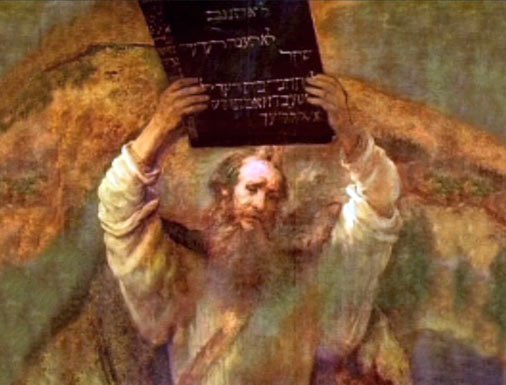
We live in a time when there is a generalized tendency to reject moral precepts as outdated and unnecessary. It looks as if by following one’s heart all the time one could end up doing what is best. But is that really so?
Jesus Himself said He had not come to do away with the Law, but to give it its true fulfillment. And while it is true that He also stated that by following the commands to love God with our whole being and our neighbors as ourselves we would be fulfilling the two greatest commandments of the Law, He by no means implied that God’s instruction to His people was outdated or useless.
Although the Hebrew term Torah was translated into Greek as the equivalent for Law, in fact this term is better translated as instruction or teaching. It was God’s intent to guide His people to a kind of life that would make them “a people of priests and a holy nation”.
Here we can see the spiritual value of God’s commandments. The core of the Torah is the Ten Commandments given to the chosen people through Moses, the main leader of God’s people. If we take a close look at them, we notice that they are meant to be a guide to the people’s relationship with their Creator and Liberator, and with one another. The aim of the first four is to guarantee an intimate relationship with God, through the recognition of His essential goodness and loving care for His people, the commitment to be faithful to Him as the only true God, and to spend quality time with Him on a weekly basis (the Sabbath).
Then come the rest of the commandments that instruct God’s people how to relate to one another in a loving and caring way, starting with the unalienable duty to the persons who gave us life (our parents), and moving to the relationship with all those in the community, valuing and respecting each person as the living image of the common God that has created us all equal.
As Christians, we need to revisit God’s guidance once and again, and even though we recognize that by our own efforts we cannot fulfill God’s instruction (but that it has been only through Christ’s self-sacrifice that the way to redemption has been opened to us) we should not despise this guidance, but ask the Holy Spirit to assist us in fulfilling it.
Paul himself recognizes in his letter to the Romans that the Law is spiritual but that he has a hard time contending with the flesh to fulfill it. That happens to us all, but it does not render God’s instruction useless. It only points out to us how dependent we remain on God’s saving grace through Christ, in the power of the Holy Spirit, and how valid God’s commandments are as our main goal to achieve.
The writer of Psalm 19 says that the Lord’s judgments are “more to be desired than gold, more than much fine gold, sweeter far than honey, than honey in the comb.” So may it be with each of us.
Fr. Carlos Expósito, Rector
|
RETURN TO TOP
When Losing Means the Greatest of Gains
This Sunday and Beyond - February 28, 2021
Get it in PDF form with calendar
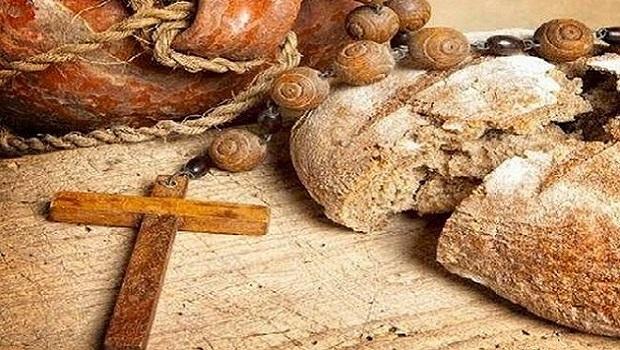
Fasting as a spiritual discipline is found in practically all religions. Abstaining oneself from food or drink, or in a wider sense perhaps, from the things or habits that we are most addicted to, may be a liberating personal and communal experience.
What happens when you fast? You deprive yourself from your routine food or drink intake. You stretch your body needs, so to speak. You humble yourself before your Creator. You partially empty yourself and make room for something different. Only the empty or almost empty space can take in something new. Cluttered spaces have room for nothing else.
It is mainly for this reason that the spiritual practices of fasting and self-denial are encouraged in religions, especially during certain times of the liturgical year. Lent is the season that reminds us of Jesus’ 40 days of fasting, prayer, and meditation in the wilderness. It is a preparatory period for the major week of the Christian Year, Holy Week, when we enact and live out Christ’s passion, death, and glorious resurrection.
This preparatory period for Jesus has antecedents in the Old Testament. The number 40 is significant in Holy Scripture. God’s people went through the wilderness for 40 years before coming to the promised land. Moses prepared himself through fasting for 40 days before receiving the Law, and so did Elijah before receiving God’s final command.
When we fast or deprive ourselves of certain things to share them with those who are in need, it seems as if our life is being restricted, as if we are losing parts of our lives. In fact, that is the intention. By emptying ourselves of what we routinely value as important or even essential in our lives, we can open space for what is real and valuable in God’s eyes for us. And God always knows best.
When Jesus tells His followers to deny themselves, even to the point of losing their physical lives if needed, He is not thinking of punishing them or giving them an impossible task so they give up on it. He is making the point that unless we get rid of a lot of unnecessary self-gratifying clutter in our lives, God’s loving life cannot take its due place in us -- simply because God’s loving life is utterly selfless and all sharing.
The Lent disciplines seem hard to undertake because they move in a direction that is contrary to our ingrained habits and routines. Nevertheless, by following them properly, in a spirit of humility and openness, we have much to gain, and what we may see as loss is the blessing of getting rid of ballast, so that our lives can soar to the blessed heights where our loving Christ, together with the Father and the Holy Spirit, awaits us to share His abundant life with us.
Fr. Carlos Expósito, Rector
|
RETURN TO TOP
Diversity Is Not Divisiveness
This Sunday and Beyond - February 21, 2021
Get it in PDF form with calendar

In Chapter 9 of the Book of Genesis there is a story about God’s covenant with Noah, his sons, and every living creature that has survived the flood. This covenant is meant to last till the end of times on our planet. It is a covenant of preservation—preservation of God’s wonderful diverse creation, including humankind. The symbol for this covenant is the beautiful multicolored rainbow in the sky.
Creation itself is based on diversity. Scientists now know that all that exists has derived from one primordial undifferentiated source which, through a gradual process of diversification has produced our multivariate universe and eventually, our wonderful planet with its teeming diversity of life forms. They also now recognize the undeniable interconnection that exists in all created forms, living or not living, and there is a trend in the scientific world to acknowledge that there seems to be a purpose permeating all the universe, which manifests in the emergence and preservation of life.
The rainbow is the result of the breaking up of the sun’s light into its diverse components. The white light comprises all these beautiful colors that we see when the rain drops suspended in the sky act as the agents that make this diversification possible. We have all been amazed at its beauty, particularly when the colors are intense, and the rainbow is a complete semicircle. Sometimes we have even been blessed by the appearance of a double rainbow in the sky.
The diversity of creation and its life forms never ceases to delight us. Humankind is also multivariate. But diversity itself can create the illusion of separateness.
When we make the white light go through a prism, we obtain the full spectrum of colors of the rainbow. But placing an inverted prism on the other side will make these separate colors recombine into the white light again. The lesson we should learn from this well-known experiment is that no matter how diverse creation is, the essential unity is always there.
For us Christians, the essential source and origin of all that exists is God. We humans and all that exists in the universe have our origin in our loving Father, and that is an essential truth we should never forget.
God created each of us humans in his likeness and image, which includes the free power of being creative, and an essential individuality that makes each of us unique. So great is this free power, that it enables us to deny our common source and act as if we were totally separate entities, with egotistic intents that make us believe we are the center of the universe and that everything and everyone else is subordinated to our interests. This is no longer diversity but divisiveness. Such divisiveness has been and still is the main cause of the evil in this world.
In the long run, the individuals that fall prey to this illusion, and those who let themselves be led by such “leaders” end up being the unhappiest persons on earth, and suffer the real death we should all fear, that of being separated from the unifying source of life, the Creator Himself.
Our Creator has deliberately made us free, not with the intent to make us fail and confuse diversity with divisiveness, but to make us responsibly choose and make the right decisions. This is known as temptation. Without it there is no real spiritual growth and maturity. When we are not faced with the need to distinguish between the right perception of our unique nature and the danger of believing that we are separate from the rest, we cannot grow as humans, and we are a poor reflection of the divine. Every time we come out victors in this choice, we grow closer in reflecting our Creator’s nature, which is essentially our own.
Jesus is given an assurance of His divine affiliation and God’s love for Him in His Baptism at the Jordan River. He certainly needs this reassuring statement and the power of the Spirit for the special salvific mission God has entrusted Him with. But He also needs the growth and maturity that can only be attained by the inner meditation on His nature and purpose. His unique individuality as a human being that incarnates the Creator’s image in such a perfect way also gives Him unusual possibilities that may be tempting indeed. What if He chooses to follow His own way for the purposes that He considers best for Himself?
But no, He chose rightly. The tempter was utterly defeated. He was surrounded by the diverse creation in the wilderness, including the beasts. Diversity reminded Him of our essential unity in God, and God’s messengers, the angels, who always heed the ones who follow God’s plans, who served Him.
Lent is a season for spiritual disciplines, aiming to spiritual growth. May we also be tempted by our uniqueness in the diversity of creation, so that by consciously choosing to be faithful to the essential unity, we defeat the notions of divisiveness that separate us from one another, from the rest of creation, from ourselves and from our God.
Fr. Carlos Expósito, Rector
|
RETURN TO TOP
A Still Small Voice
This Sunday and Beyond - February 14, 2021
Get it in PDF form with calendar
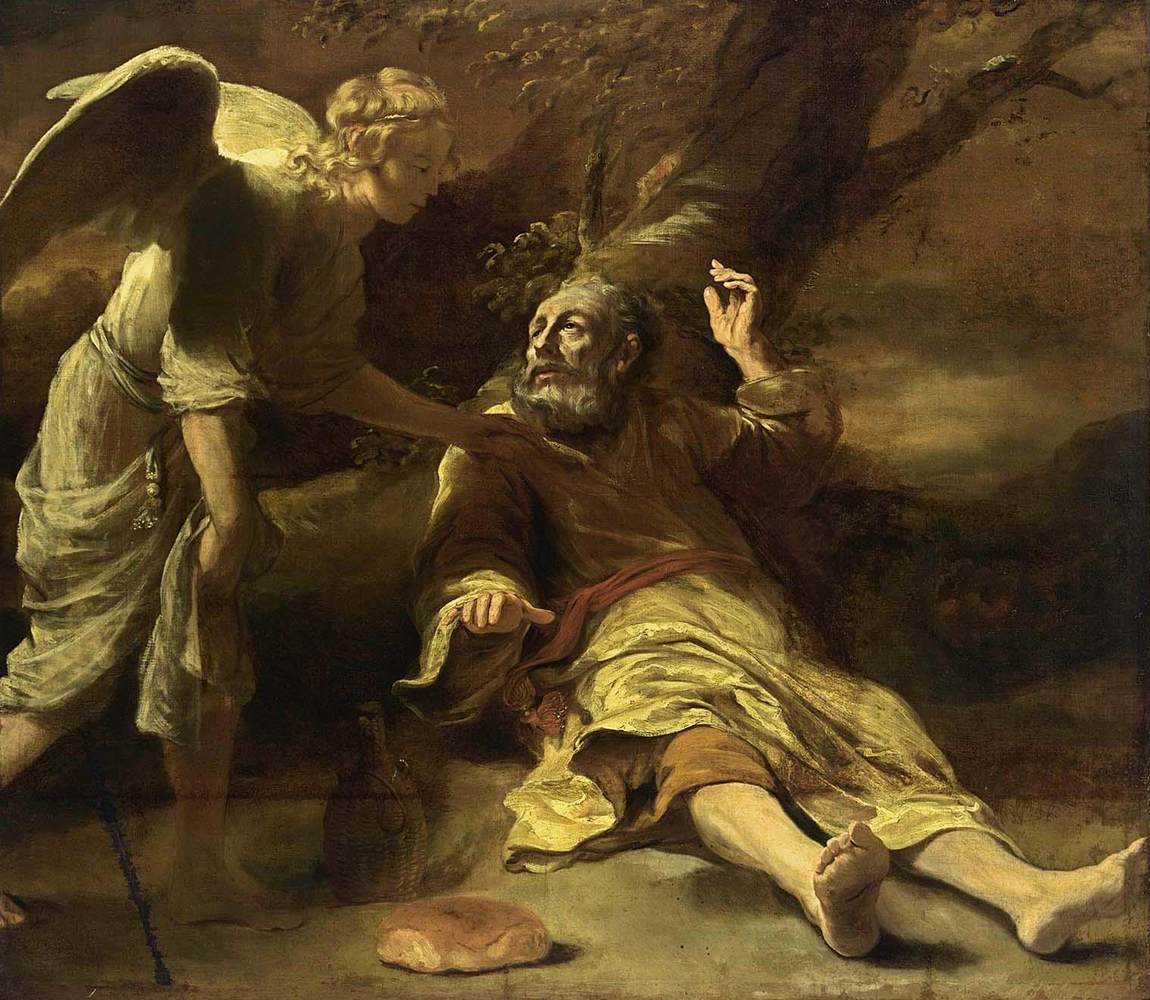
Movies and TV series will have us believe that the manifestation of transcendent powers is always accompanied by flashing lights, deafening noises, tremors, strong winds or the like. In fact, this resonates with some Bible passages, particularly those that refer to Moses and the way God manifested to him in the sacred mountain. These divine manifestations are known as theophanies.
One passage in the Second Book of Kings presents a totally different perspective though. It refers to Elijah’s encounter with God at Mount Horeb, another name for Mount Sinai, the mountain where Moses was given the Law for God’s people. In this account, the writer deliberately preludes Elijah’s actual encounter with God with the phenomena that usually signaled theophanies. There was a great wind, an earthquake, and a fire, but the writer specifically states that God was not present in any of these. And then there is a still small voice, or a sound of sheer silence, as some other translations render the expression.
This still small voice is what clearly makes Elijah recognize God’s presence. He immediately covers his face reverently and waits for God’s instructions to him. God speaks to him within this sheer silence.
This last Sunday after Epiphany brings us the Gospel passage of Jesus’ transfiguration. The three synoptic gospels tell this story, and our church lectionaries always end this season with this account. It is the culmination of Jesus’ manifestation or revelation as the divine Son.
We might think that Jesus’ transfiguration is more in line with the usual theophanies, especially because of the dazzling glorious light that was manifested in Jesus. It may be. But we need to remember that this was mostly a private event. It was meant for the innermost circle of disciples, the three that accompanied Him on special occasions. There was a vision of Moses and Elijah, the greatest representatives of the Law and the Prophets, who had also had theophanies on the Sacred Mount, and had been given divine instructions to follow. And there was the divine voice that repeated what Jesus had heard on His baptism, plus a clear injunction to these three disciples, “Listen to Him”.
Being in the glorious presence of the divine is an overwhelming experience. It can give rise to rash reactions, as it did in the case of Peter. He simply expressed his desire to remain in that blissful state for as long as possible. But this was just a moment to be cherished and remembered. They had a taste of Jesus’ glory and mission. The presence of Moses and Elijah and their conversation about what Jesus had to undergo was the indication that Jesus was the recapitulation and fulfillment of Holy Scripture. He was the Word made flesh, and His voice needed to be heeded.
Although the transfiguration of Jesus has often been interpreted as a foretaste of His glorious Resurrection, it can also be seen as the presence that always is and we fail to see. The transfiguration was much more about the disciples than about Jesus. It was their inner eyes and ears that needed to be transformed to see and hear the truth about the identity of the one they had been following.
Likewise, we, His present-day followers, need to be transformed to perceive God’s constant presence in us and in all others. And in a world that is characterized by so many blinding artificial lights, so much noise and misleading voices, and other phenomena that try to emulate and feign the authentic theophanies, it becomes imperative that we make a pause in our frantic daily turmoil, and turn to the still small voice, to the sound of sheer silence within, so we can perceive Our Lord’s Presence and heed His voice.
Fr. Carlos Expósito, Rector
|
RETURN TO TOP
Urged To Share The Good News
This Sunday and Beyond - February 7, 2021
Get it in PDF form with calendar
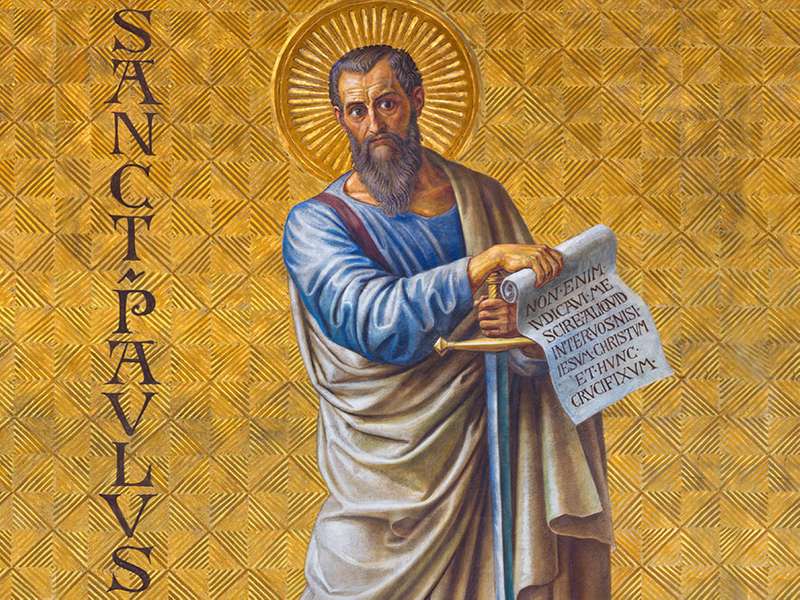
In Chapter 9 of his first letter to the Corinthians, the Apostle Paul speaks about the obligation he feels to proclaim the Gospel he himself received from Christ. Such is the force he feels compelling him to share the Good News of salvation, that he exclaims, “woe to me if I do not proclaim the Gospel!” He does not conceive the task as something of his own will, but as a commission he has been entrusted with.
At the same time, Paul recognizes the total freedom that being a follower of Christ entails. Christ has come to restore us to God’s image, and this image presupposes that the Creator, who is totally free, has also endowed us with total freedom of choice.
The issue of free will has often been discussed by believers and unbelievers. The main problem with the understanding of this freedom is that we tend to forget that there can be no real freedom without right discernment and responsibility. A world in which individuals feel they are free to do as they please, without being held accountable for the consequences of their acts is not a free world, but a chaotic world. It is a world that would look very much like what is described in Genesis before God’s breath or Spirit blew upon the waters of Creation to bring order and beauty out of the primordial chaos. Only, what was normal and expected at that point because it was at the beginning of time, would now be totally absurd and undesirable.
The misuse of freedom by humans is what has brought about most of the past and present evils in society, and even in nature. The Good News that Jesus proclaimed is precisely about a total reversal of this situation. It is about following a radical Way of Love as our rule of life. When unconditional love is practiced, abundant life ensues. It is not about restricting freedom of choice or becoming other people’s slaves. It is about basing our choices on the supreme law of love. This is what real freedom is all about.
To make his point clear, the Apostle Paul states how he has made himself “a slave to all” despite his complete freedom with respect to all. The reason why he does it is to win the different classes of people he proclaims the Good News to (Jews, Gentiles, weak converts) for Christ’s Gospel, adapting his way of preaching accordingly, without losing the essential salvific message for all.
Proclaiming Christ’s Gospel of justice, peace, harmony, restoration, and abundant life in God’s love, is not something we, his followers, should consider as a personal choice. If we understand our freedom rightly, the way God has given it to us, we should also be aware of the urgency to share this Good News with all. This is the Great Commission we have been entrusted with -- and “woe to us” if we do not heed it.
Fr. Carlos Expósito, Rector
|
RETURN TO TOP
Knowing or Loving?
This Sunday and Beyond - January 31, 2021
Get it in PDF form with calendar

In his first letter to the Corinthians, Paul the Apostle addresses the problem of eating or not eating the food offered to idols. He is aware that for some converts who are really convinced of the futility of idols, eating, or not eating food offered to them does not make any difference. But he is also aware that not all new converts have such a strong conviction. As he states it, their conscience may still be weak, and seeing others do this may encourage them to eat this food as if it were really a way of worshiping idols. Thinking that because they have the real “knowledge” they can do what they want, those who do not take the weak into account are really destroying those for whom Christ has died. They may have the “knowledge”, but they certainly lack the love.
As Paul puts it, “knowledge puffs up, but love builds up. Anyone who claims to know something does not yet have the necessary knowledge; but anyone who loves God is known by Him.”
All earthly knowledge is incomplete, as science has proved by having to change its “truths” in the course of time. No one can claim to know everything. People who have common sense will always acknowledge the incompleteness of their knowledge. Only God’s love, which is unconditional and all-encompassing, can be equated to the real knowledge, the one that “comes from above”.
The Hebrew language uses the same verb for “knowing” and “having sexual intercourse with”. That is why some translators who want to keep the flavor of the original use of the verb know in this sense, as when Mary says to Gabriel after the archangel announces that she would conceive in her womb, “How shall this be seeing I know not a man?” There is great wisdom in this. Only when people have close contact and can put themselves in the others’ shoes, experience what they experience, feel what they feel, can they say they really know a person. This knowledge implies love for that person. It is like a shadow of God’s way of knowing, which is based on love.
This is the kind of knowledge that enabled Jesus to have the authority to push the forces of evil back and make abundant life manifest itself in his healing acts. It was not a mere knowledge of natural or supernatural forces, as some would like to imply. It was the powerful manifestation of the force of love that restores the harmony of all that the person is, as God’s image on earth. His teachings were based on the law of love. His deeds were always prompted by this love. And though he was probably as well versed in Scriptures as the scribes of his time, people noticed the difference. They realized that He said and did things based on a different authority, the knowledge that comes from above, which is God’s all-knowledgeable love.
If we want to follow in Jesus’ steps, and continue the teachings of the apostles, like St. Paul, we will do well to consider that knowledge is good and convenient, i.e. knowledge of the laws of nature, of the different sciences, languages, etc. But it is also essential to realize that this kind of knowledge is always limited, and that by itself it will not make God’s kingdom come. The spread of a more unconditional kind of love that imitates Christ’s love for all is what will make this world a better place. Let us strive for its growth in our own lives and the lives of those we can influence by our loving words and deeds. Then real “knowledge from above” will become manifest in our lives.
Fr. Carlos Expósito, Rector
|
RETURN TO TOP
A Generous Response to God's Call
This Sunday and Beyond - January 24, 2021
Get it in PDF form with calendar

In his first letter to the Corinthians, a document that most scholars unmistakably ascribe to St. Paul, the Apostle talks about the converts’ response to God’s call.
A great difference between other religions and both Judaism and Christianity is the fact that most religions make emphasis in the quest of the divine by human beings. The divinity remains in inaccessible realms, waiting for humans to search for the divine and ascend to higher dimensions through their own efforts.
Though both Judaism and Christianity recognize that God is beyond all human understanding, there is an initiative by God to call His people to covenants, to offer them redemption from their trespasses. This is like a downward movement from God to humanity, His revelation or epiphany. In the Old Testament this is especially apparent in God’s call to Abraham, to Moses, to Samuel and the rest of the prophets.
This downward movement of the divinity reaches its climax in the person of Jesus of Nazareth, true man, and true God. This is God’s self-emptying to reveal Himself to humankind in human flesh. His incarnation is the perfect epiphany, the perfect manifestation of God’s selfless love in the space-time continuum of human history, as Jesus’ Way of Love for all.
As part of God’s salvific plan for humankind and the restoration of the whole of creation, Jesus calls others to follow Him in this mission, so that it can be taken to the ends of the earth until the ends of time. Unlike what was customary in Judaism, where those who wanted to become a teacher’s disciples had to work hard towards being admitted as such, it is Jesus who calls simple fishermen to follow Him so that, as he states, they can become “fishers of men”. We can only imagine how enthralled these disciples must have felt to have been called by a teacher who did not even question their preparation or humble origins, but simply invited them to follow Him. Such a generous call could not but invite a generous response.
St. Paul, the great Apostle of the Gentiles, followed in Jesus’ footsteps in inviting others to follow our Savior’s path of redemptive love. As Paul clearly states, there is no precondition to follow Jesus and no one must change their social condition to become a follower. The only condition that Christ’s generous call requires is to follow His commandments, and that translates into loving God with our whole being, and loving others as we love ourselves.
We have been bought out of the slavery of sin and death by a high price, Jesus’ self-giving of Himself on the cross, as Paul clearly points out. So let our generous response be our commitment to spreading the Good News of our regained freedom in our words and deeds.
Fr. Carlos Expósito, Rector
|
RETURN TO TOP
Keep the Light Shining
This Sunday and Beyond - January 17, 2021
Get it in PDF form with calendar
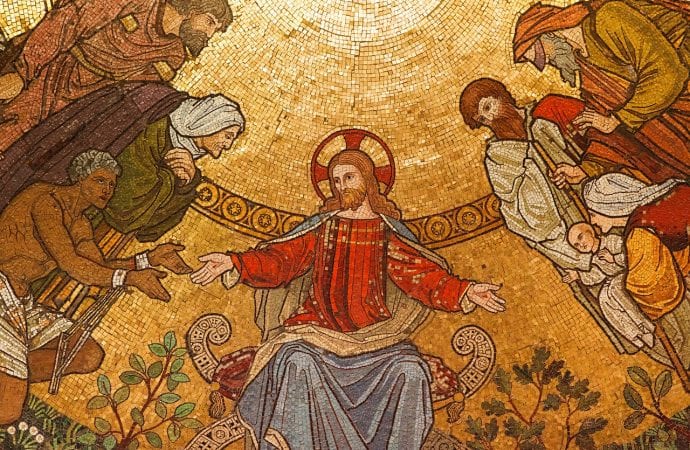
The Season after the Epiphany of our Lord is about how Jesus, the Light of the World, is made known to others at different moments of His earthly ministry. But it is also about how Jesus makes it clear to His followers how this Light is meant to shine for the world, not only in His person, but in all those who choose to become His disciples.
Being Light means, above all, being one who can dispel the darkness of ignorance, selfishness, and lack of love that so much abounded in Jesus’ world and in our present world. Quoting those who have given witness to the Light, like the prophets in Holy Scripture, can be of help in casting out the darkness, but it is mainly through our own personal and communal lives that people can better see the Light, and that could be the best incentive to follow Jesus’ Way of Love.
In his first letter of the Corinthians, one of the letters that scholars agree is unquestionably written by Paul, the Apostle reminds his addressees of all the blessings that Jesus’ self-sacrifice on the cross has brought them, and how thanks to this high price paid by Our Lord, they are now sanctified and justified in His name and the Spirit of God. He also makes it clear that, by becoming one with Christ in our baptism, our own bodies are members of Christ Himself, and temples of the Holy Spirit. That reminder should serve as a shield against falling back into the darkness, letting our Light be snuffed out.
In the Gospel reading for this Sunday, there is a story of Jesus meeting Nathanael, one of His followers. At first, Nathanael did not believe that Jesus could be the Christ, simply because He came from Nazareth, a town that is not even mentioned in the Hebrew Scriptures. When Jesus mentions that Nathanael had been under the fig tree before, when He was obviously not physically there to see him, Nathanael changes his mind and proclaims Him the Son of God. Then Jesus says something to him that we should all pay close attention to. He says that he will see greater things and that the heaven will be opened to him, and he will see the angels of God ascending and descending upon the Son of Man.
In other words, Jesus is telling Nathanael that he will receive the Light, total illumination, a full communion with the Creator and the whole of creation. That is the glorious destiny that Jesus has promised for the followers of His Way of Love. His Light is to become our Light, and this our Light is to shine bright to cast out the thick darkness of our world.
Fr. Carlos Expósito, Rector
|
RETURN TO TOP
Becoming What We Are Meant to Be through God’s Grace
This Sunday and Beyond - January 10, 2021
Get it in PDF form with calendar
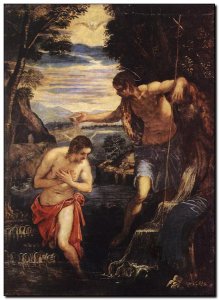
The First Sunday after Epiphany brings us to the Baptism of Our Lord Jesus Christ at the River Jordan. The account of Jesus’ baptism in the Jordan by John is present in the three synoptical gospels (Matthew, Mark, and Luke) before the beginning of his earthly ministry. John’s gospel does not depict the act but refers to it in the words of John the Baptist, when he mentions he saw the Holy Spirit descend upon Him like a dove.
In the depiction made by the three synoptical gospels, the ending is always presented in similar words: “and a voice came from heaven, ‘You are my beloved Son, with you I am well pleased’.”
This statement made by the Father to the Son is celebrated within the season after the Epiphany of Our Lord as the one that distinctly marks Jesus’ divine affiliation. In fact, the first part of the statement will be heard again at the scene of the transfiguration but addressed to the three disciples that Jesus takes to the mount. Therefore, we can affirm that the season after Epiphany opens and closes with the same statement that reveals Jesus’ true nature to Himself and those who decide to follow Him.
Understanding and believing that Jesus is God’s beloved Son in whom He is well pleased is a premise for the Christian faith. If we do not believe this, we may be among those who consider Jesus as a great spiritual teacher, but not among the ones who firmly confess He is God’s Son, the Second Person of the Holy Trinity, incarnate by the power of the Holy Spirit, true man, and true God.
However, our faith does not stop there. This is only the premise of what the mystery of the Holy Trinity involves. God’s plan of salvation for all is revealed through Jesus Christ as God incarnate, but this belief involves much more than the mere acceptance of His divine affiliation. In the scene of the transfiguration God repeats the phrase about Jesus being His beloved Son, but adds, “Listen to Him!”.
Listening to Jesus implies following His Way of Love. Jesus’ Way of Love is an inclusive way, a graceful way, a love that is freely offered to all. It is not the result of some merit of ours. What Jesus offers us is a partaking of His divine affiliation through His self-giving life. By coming into the world as one of us, and giving Himself for the life of the world, He takes us to the Father as true sons and daughters, as the beloved ones of the Father too.
Our affiliation as God’s true children is the result of His boundless love. Our baptism is the covenant by which this becomes possible. In the waters of baptism, we are buried in Jesus’ death and reborn to His resurrected life. The voice He heard speaks to each of us then, calling us beloved children in which God is well pleased.
When hearing these words, we are assured of God’s unconditional love for each of us. The response to such love cannot be other than love. Love for God and for the others, for the whole of Creation. This is summed up in our Baptismal Covenant. We respond to God’s graceful and loving initiative by committing ourselves to be bearers of His love to the world.
By our generous response to His all-encompassing love, we begin to be transformed into what we have always been meant to be, God’s beloved children, in whom He is well pleased.
Fr. Carlos Expósito, Rector
|
RETURN TO TOP
An Episode of the Christmas Season: Jesus the Refugee
This Sunday and Beyond - January 03, 2021
Get it in PDF form with calendar
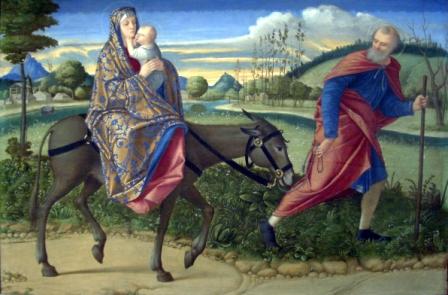
When we look at the narratives that Matthew’s Gospel brings us about the first years of Jesus on earth, we immediately notice how unsettling these events were and how much pain, suffering and uncertainty they brought to Jesus and His parents.
After the visit of the Magi King Herod, full of rage for having been tricked by these foreign visitors who foresaw his evil intentions, orders what has become known as the atrocious killing of the innocent children in all the region of Bethlehem. Joseph is warned about this killing in a dream by an angel and he, Mary and Jesus flee to Egypt where they remain until the death of Herod.
So, the child Jesus, together with His parents, must escape to a foreign land, and they need to make a living there, in a place where they probably do not know a soul, where they have different customs and a different religion, where they worship other gods. They become refugees. Foreign people in a land where they feel alien and are received as alien. Second-class people. The Gospel does not give us any details about how their life went by in this place and time, but we are all familiar with the condition of refugees and how hard it can be.
Today’s world is full of refugees. People from different parts of the world literally need to flee from their places of origin, flee from death and war, from oppression and discrimination, from famine and subhuman conditions. And their fate in the countries where they move to is not always favorable.
Matthew’s narrative should be a good reminder to all that the one we call our Savior shared this condition together with His family. And that should prompt us to realize that by becoming fully human, Jesus’ life was, even in His early years, hazardous, full of dangers and suffering, uncertainty, and fleeting moments.
He and his parents did return to the land of Israel. His mission had to start out with His own people, in His native land. They went to live in Nazareth, in Galilee of the Gentiles, a place with no worldly significance, but the Evangelist uses a play of words here to signify that by being called a Nazarene (from Nazareth) He was also a ‘Nazorean’, which means ‘preserver’. In this sense, Jesus and his followers are considered the real remnants of the original Israel as the people of God.
By becoming a refugee in His early years, Jesus also reminds us that the Son of God was an alien, just as so many people are alien in different countries nowadays. That should make us change our own attitude towards aliens and make us realize that we are all called to welcome aliens, because the image of the living God is imprinted in their faces as it is in ours.
In a deeper sense, we Christians are all called to be aliens in this world. We are not to follow the fads or conform to this world but oppose all that is contrary to God’s reconciling love for the world. True Christians have always been countercultural, and in this sense, they are more like refugees than those who follow the dictates of the world.
Jesus the child was also Jesus the refugee. His human nature chose to incarnate that condition as well. He exalted it in His own human person, and so must we, in every refugee, in our own selves.
Fr. Carlos Expósito, Rector
|
RETURN TO TOP
Emmanuel—God with Us
This Sunday and Beyond - December 27, 2020
Get it in PDF form with calendar
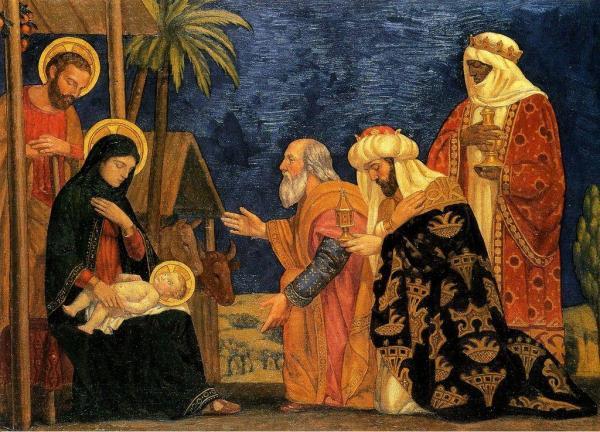
Christmas is the Season that proclaims the salvific mystery of God’s incarnation. God made flesh. God born into this world as a baby boy.
He who created all that is, He who cannot be known or even conceived by the human mind, He who transcends all human or superhuman concepts, has now come to live with humankind, not as a superhero, not as a Greek demi-god, but as a real human being, subject to all the limitations of human nature. It is God’s self-emptying. He whose Glory surpasses all we could ever conceive, has come down to earth in human flesh.
And what could be the purpose of God’s self-emptying and incarnation?
Could it be God’s curiosity or need to experience what we human beings feel throughout our mortal lives? If we believe in an omniscient God, then the thought that there is anything about our lives that He does not know is inconceivable. But there is clearly a purpose in incarnation, and it has to do with God’s unconditional love for us all.
Throughout the history of Israel, God manifested Himself mainly as God for us. He carried out wondrous deeds of salvation for the Israelites, delivering them from the hands of their enemies and leading them through His prophets to the right way of living. He gave them commandments so that their lives could be in a more harmonious relationship with their God, with one another and the whole of Creation. But the people always thought of God as a transcendent being, one that took care of their needs but was always beyond their reach.
Eventually, prophets like Isaiah began to glimpse a time when God would not only do wondrous deeds of salvation for His people, but would come to live among them, in their midst, and he called this child to be born Emmanuel, which means God with us. He was probably thinking about a king who would carry out God’s will with so much faithfulness that he would practically make God’s presence be felt among His people. New Testament writers later interpreted this as a reference to Jesus Christ Himself.
The coming of God the Son to this world happened at the place and time that God saw fit. New Testament writers call it in the fullness of time. He inaugurated a new era for this world. He made God’s unconditional love for us and all of Creation tangible as never before. He showed us His Way of Love in His own human person and prepared His followers to carry out the salvific reconciliatory mission throughout the times, until God can become all in all.
God’s incarnation has nothing to do with any merits of ours. The world where He incarnated was not neat and righteous. Just as it is today, it was a world full of mess, confusion, and conflict. It was out of sheer grace that God became Emmanuel, not to please Himself in a world of solace, but to share His self-giving love with us all, and He relentlessly continues to do so till this very day.
Fr. Carlos Expósito, Rector
|
RETURN TO TOP
Preparing Christ's Dwelling Place within Us
This Sunday and Beyond - December 20, 2020
Get it in PDF form with calendar
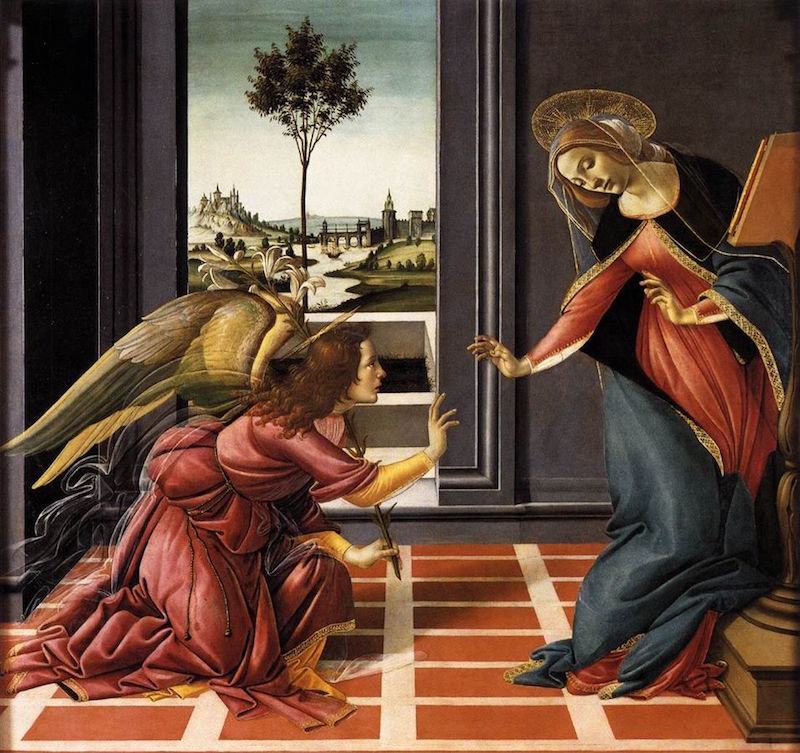
The Collect for this Fourth Sunday of Advent urges us to purify our conscience ‘that your Son Jesus Christ, at his coming, may find in us a mansion prepared for himself’.
The thought that comes to our mind when we speak of a mansion is a lavish home with fine premises and decorations. It may have been the intention of the person writing this prayer to stress the fact that our God deserves the absolute best inside us to be offered to Him as His dwelling place within us. Even so, the Old Testament shows us that God’s preferred dwelling place was a moving tent, and Jesus clearly stated that ‘the son of man had no place to recline his head’.
It was only later in the history of Israel that a magnificent temple was built as a symbol of God’s presence, but the prophets and Jesus himself had a clear notion that God did not need a fixed building as a dwelling place, since the whole world is His.
Our God has no needs. It is us who have a constant need of Him, and He is always trying to find the way to dwell with us, because His love for us is greater than our human understanding.
When God approached Mary through Gabriel to make the mystery of His incarnation possible, He was clearly not looking for a woman of high social standing or prestige. God was looking for a tent where He would be welcomed, where the encounter between the human and the divine would take place in the humblest of ways, with total acceptance.
The angel’s greeting to Mary is clear: God is with you! He does not refer to a future event, but to an ever-present reality. God is always with each of us. It is us who often try to run away from Him. God is certainly not looking for “mansions” in an earthly sense to make a dwelling with us. He is always inviting us to open the tents of our hearts to His constant presence, so that He can be on the move with us, and guide us all along the way, as He did with the Israelites in the desert.
The initiative is always His, but we need to make room for Him in the tents of our lives. A clean, roomy, and open tent will do. The mystery of His incarnation was made possible thanks to God’s self-emptying with the cooperation of a young maiden with a total willingness to obey His will for her. But His incarnation is a continuing and ever-present reality in each of us now. He wants to keep on living with us, among us, in us. Let us do our part by cleaning, making room and opening wide for Him the tents of our lives.
Fr. Carlos Expósito, Rector
|
RETURN TO TOP
Rejoice always!
This Sunday and Beyond - December 13, 2020
Get it in PDF form with calendar

In the First Letter of St. Paul to the Thessalonians—the document that several scholars agree was the first New Testament writing—he urges them to rejoice always, to pray without ceasing and to give thanks in all circumstances. And the reason for this requirement is clear: “this is the will of God in Christ Jesus for you.”
The Third Sunday in Advent is known as Gaudete Sunday, a Latin word that means rejoice, precisely because the words of the introit in the Roman mass are taken from this Epistle of Saint Paul to the Thessalonians, beginning with the word Rejoice. The color for this Sunday is rose, and flowers are used at the altar. It is like a break in the more solemn tone of Advent, giving way to the deep feeling of true joy that the certitude of this hopeful wait brings us amid our tribulations and uncertainties.
Our modern world is full of lures that push us towards the attainment of material satisfactions. The level of sophistication of these attractions has risen considerably in the last decades. The ones that have better financial means can attain more of these, and so life centers in competing with one another for better gains. But the fact is that there is a never-ending vicious circle of wanting more. And no true joy is ever achieved.
Talking about rejoicing in our present situation may sound like an irony. There has been and there is still a lot of suffering this year. However, it is not hard to imagine that the recipients of Paul’s letter were not in a much more favorable situation. These were new converts. People who had given up their pagan religion and embraced the faith of Jesus’ Way of Love. But this had a cost. It severed their bonds with their well-established communities, even with family members. It brought them conflict and suffering — even persecution.
Only constant prayer and a deep feeling of thankfulness for the peace and grace that their unshakable faith in Christ’s redeeming power brought them, could keep them going. And this great faith is always expressed in authentic joy. But this is a joy to be shared. Losing the bonds of their previous pagan worship had to be replaced by the strong bonds of the Christian church, the holy assembly. That is why Paul commands them to greet all the brothers and sisters with a holy kiss and to read the letter to all of them.
Today we Christians also need to pray unceasingly, and give thanks to God in all circumstances, because our true joy does not come from passing favorable conditions, but from the deep conviction that our God is a loving God, the God that gave Himself for us so that we can have an abundance of selfless eternal life shared with all. And we need to stand together, encourage one another, share and multiply this authentic joy, and shout it from the top of the mountains if need be: Rejoice, always rejoice!
Fr. Carlos Expósito, Rector
|
RETURN TO TOP
Living in the Hope of Renewal
This Sunday and Beyond - December 6, 2020
Get it in PDF form with calendar

According to scholars, the Second Letter attributed to the Apostle Peter was probably written by someone appealing to Petrine authority after the year 125 A.D. It is commonly thought to be the last New Testament document.
At that time, there were those who no longer believed in Christ’s second coming and emphasized the “already” at the expense of the “not yet”. But in his letter the writer wants to make clear that even though it may take longer than expected, this glorious coming of our Savior, with the passing out of the old and the consummation of the new creation, is an integral part of our Christian faith.
The writer of 2 Peter is convinced that what some see as the Lord’s tardiness is due to His willingness to enable all to repent and be saved, because His all-encompassing loving nature would not want anyone to be lost.
He admonishes all the faithful to live every day in hopeful expectation of the coming of this new creation, keeping the faith and doing the loving works God expects us to do, so as to grow in the grace and knowledge of our Lord, whose glory is both for now and for the coming new creation.
This message is as valid and relevant to us today as it was when it was written. As we prepare for the coming of our Savior into our lives during this Advent Season, we should not forget that, as Christians, our ultimate hope is a renewed creation, one in which, like the psalmist says in this Sunday’s psalm, “Mercy and truth have met together; righteousness and peace have kissed each other”.
Our watch-keeping then, is not to be a passive one. We should strive towards the coming of this new creation. We should work towards it. We should make it happen. Our help in making this possible, though, is not in our own strength, as we may be misled to think. Our only help is in the Lord.
Praying and working together, led by the Holy Spirit, and united as the different and unique members of Christ’s Body, the Church Universal, we will live our personal and communal lives as if it were always Advent, always hopefully expecting, and always ready to be transformed into His ever-renewing creation.
Fr. Carlos Expósito, Rector
|
RETURN TO TOP
No Idle Wait
This Sunday and Beyond - November 29, 2020
Get it in PDF form with calendar

Advent is said to be the time of hopeful wait. The Word Advent itself is derived from a Latin root meaning coming. It is a time of getting ready for He that is coming to our lives.
It can be looked at from three different perspectives.
A past or historical perspective: Advent is seen as the preparation for the celebration of Christmas, the great mystery of God’s incarnation on earth in the baby Jesus. From this perspective, we prepare our hearts and minds to celebrate this wonderful mystery once more in our lives, and to reflect on its significance for our lives and the life of the world.
A present perspective: Advent is seen as a way to prepare ourselves for a new beginning, a new way of being that is a better reflection of God’s image in our lives. In this sense, we prepare ourselves through the reading of Scripture, meditation and prayer, with the help of the Holy Spirit, to let Christ be born in our lives and take hold of them, be our guide and ruler.
A future perspective: Advent is seen as a time of preparation for the accomplishment of God’s will in this world. We get ready for the end of times, so to speak, even when we have no notion of when it will take place. We carry on our lives in the present with the sure hope of our glorious, resurrected life in the future. To this end, aided by the Holy Spirit, we do our best to follow Jesus’ Way of Love at all times, spurned by the hope of a new wonderful world that not even in our dreams we can get a glimpse of.
It is not hard to realize that these three perspectives are inextricably intertwined and even though our focus can be one of the three at a given moment, the Advent Season considers the three of them at the same level of relevance. The first week of Advent this year, for instance, focuses on the future perspective or the end times.
Whichever the focus may be, however, one thing is always clear. As Christians we are called to live in God’s eternal Advent, because our lives are always about what we hope for with certainty, even though it is not still present. Such is the genuine Christian hope. And the wait needs to be fruitful, filled with loving activity.
It is as if we were awaiting the most extraordinary guest into the homes of our lives. We need to get rid of the clutter, the dirt, the useless stuff, and clean up and adorn, and make adequate space for our favorite guest to stay. No time to be idle. There is a lot to be done while we hopefully and prayerfully wait.
Fr. Carlos Expósito, Rector
|
RETURN TO TOP
|


























































